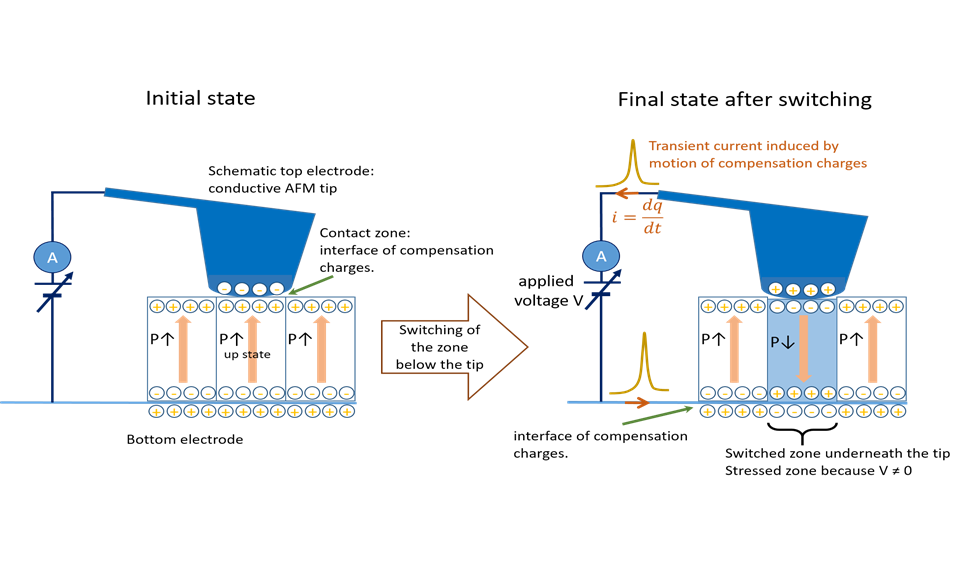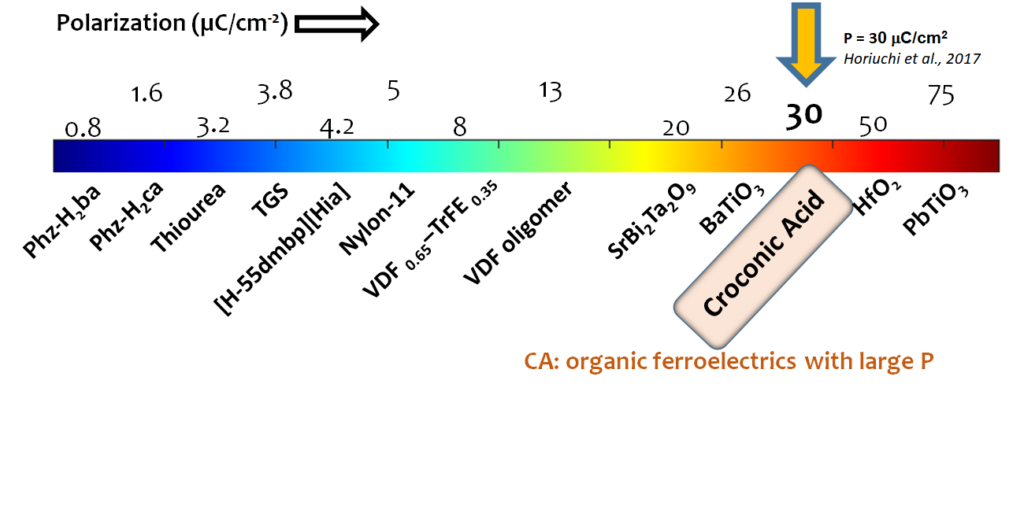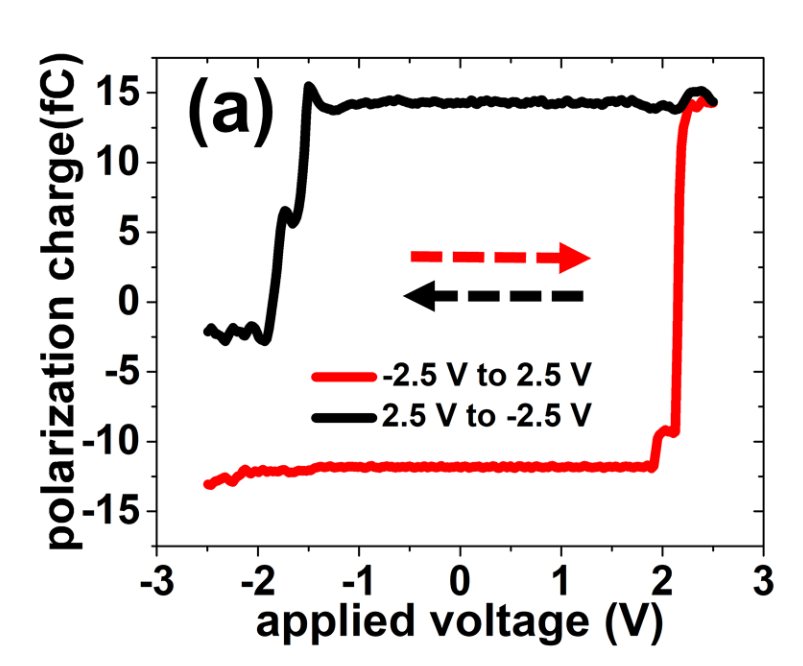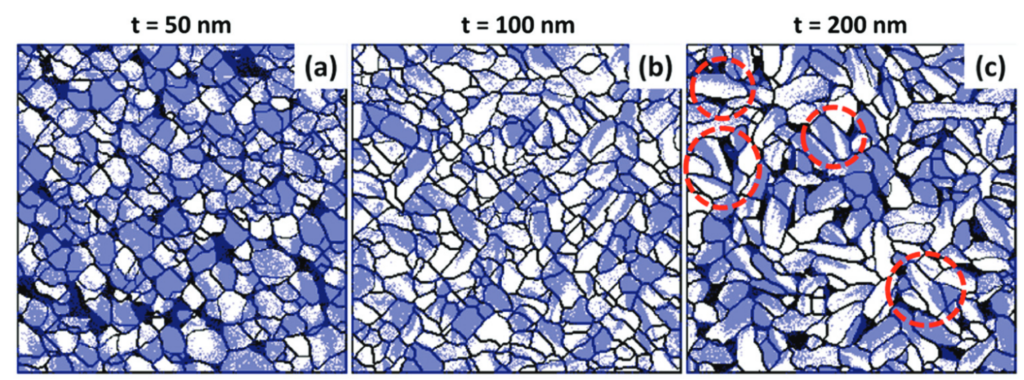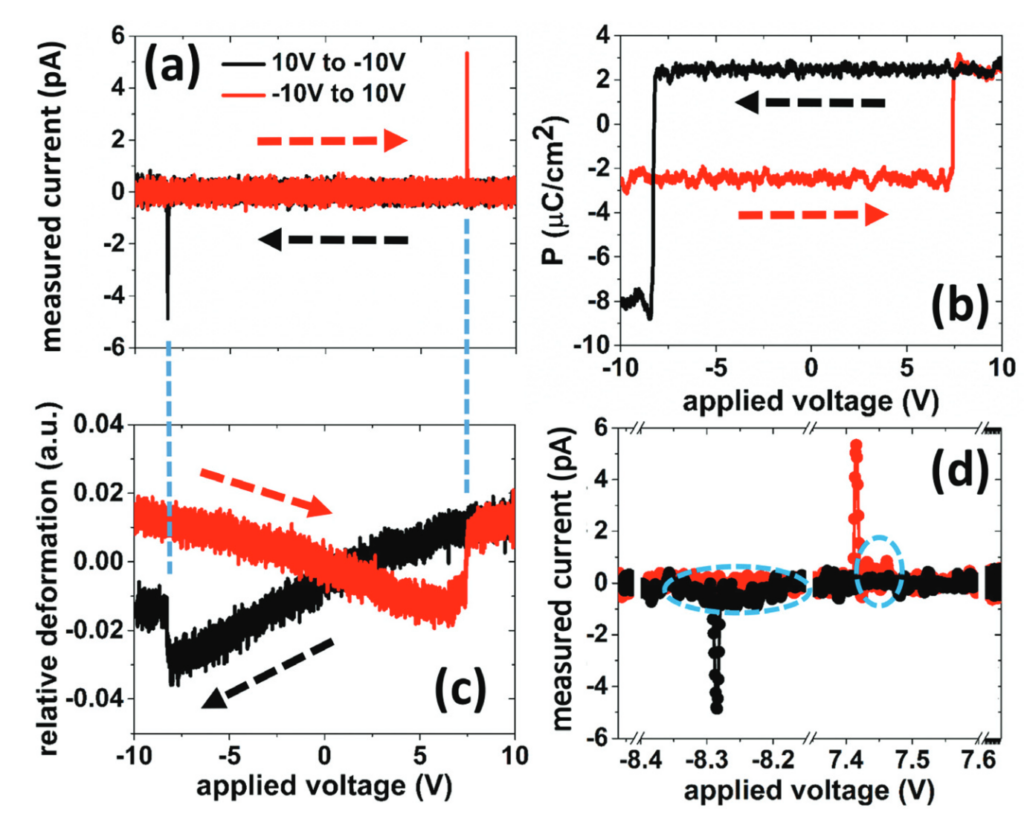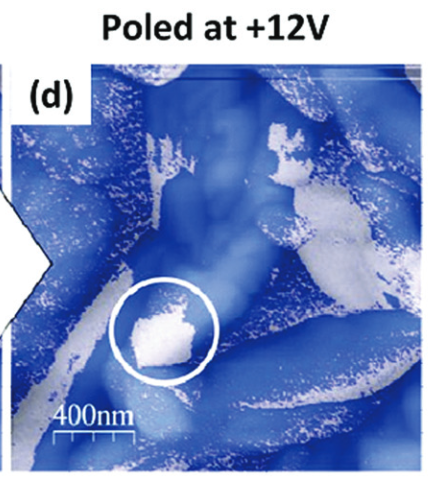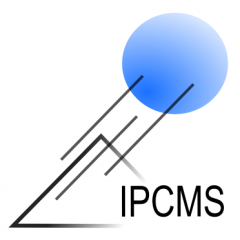Warning : Undefined property: stdClass::$lastName in
/var/www/wordpress/public/plugins/zotpress/lib/request/request.functions.php on line
166
Current researches
Principle of local switching current spectroscopy: Induced switching current by reversal of the polarization.
Schematics of polarization switching event. The upward polarization of the central zone in the initial state is reversed by the application of voltage via AFM tip in contact with the zone. The switching results in the flow of charges in the circuit to compensate the new polarization charges that appear at the surfaces of the switched zone after the polarization reversal. This generates current peaks whose shape depends on the kinetics of the switching process and the associated compensation process.
Thin films of organic ferroelectrics
Ferroelectric polarization estimation in nanoscopic systems
Local polarisation loop determined by switching current
The nanoscopic characterization of ferroelectric thin films is crucial from their device application point of view. Standard characterization techniques are based on detecting the nanoscopic charge compensation current (switching current) caused by the polarization reversal in the ferroelectric. Owing to various surface and bulk limited mechanisms, leakage currents commonly appear during such measurements, which are frequently subtracted using the device I–V characteristic by employing a positive-up-negative-down measurement scheme. By performing nanoscopic switching current measurements on a commonly used ferroelectric, BiFeO3, we show that such characterization methods may be prone to large errors in polarization estimation on ferro-resistive samples due to current background subtraction issues. Specifically, when the resistance of the ferroelectric thin film is associated with polarization reversal, background current subtraction is not accurate due to the mismatch of the I–V characteristics for two polarization states. We show instead that removing the background current by an asymmetric least-squares subtraction method, though not perfect, gives a much better estimation of the ferroelectric properties of the sample under study.
Mohapatra, S., Weber, W., Bowen, M., Boukari, S., Da Costa, V., 2022. Toward accurate ferroelectric polarization estimation in nanoscopic systems. Journal of Applied Physics 132, 134101. https://doi.org/10.1063/5.0102920
Mohapatra, S., Beaurepaire, E., Weber, W., Bowen, M., Boukari, S., Da Costa, V., 2021. Nanoscale reversal of stable room temperature ferroelectric polarization in organic croconic acid thin films. arXiv:2104.03084 [cond-mat, physics:physics].
*****
Organic ferroelectric Croconic Acid
Ferroelectric domain structure of croconic acid film
Owing to prospective energy-efficient and environmentally benign applications, organic ferroelectric materials are useful and necessary alternative to inorganic ferroelectrics. Although the first discovered ferroelectric, Rochelle salt, was a salt of an organic compound, organic ferroelectrics have not been as abundant as the inorganic ones. Further, the small polarization values in the organic systems discovered so far have been a demotivating factor for their applications. However, scientific interest and activities surrounding such materials, for the purpose of fundamental understanding and practical applications, have significantly risen lately, especially after the discovery of above-room-temperature ferroelectricity in croconic acid (4,5-dihydroxy-4-cyclopentene-1,2,3-trione, H2C5O5) crystals with polarization values rivalling those found in inorganic ferroelectrics. Its large polarization, organic nature, and vacuum sublimability make croconic acid an ideal candidate for non-toxic and lead-free device applications. In this review article, we survey the scientific activities carried out so far involving ferroelectricity in this novel material, paying equal attention to its bulk single crystal and thin film forms. While we discuss about the origin of ferroelectric order and the reversal of polarization in the bulk form, we also summarize the directions toward applications of the thin films.
Mohapatra, S., Cherifi-Hertel, S., Kuppusamy, S.K., Schmerber, G., Arabski, J., Gobaut, B., Weber, W., Bowen, M., Costa, V.D., Boukari, S., 2022. Organic ferroelectric Croconic Acid: A concise survey from bulk single crystals to thin films. J. Mater. Chem. C. https://doi.org/10.1039/D1TC05310H
Mohapatra, S., Cherifi-Hertel, S., Kuppusamy, S.K., Schmerber, G., Arabski, J., Gobaut, B., Weber, W., Bowen, M., Da Costa, V., Boukari, S., 2021. Organic ferroelectric Croconic Acid: A concise survey from bulk single crystals to thin films. arXiv:2110.12519 [cond-mat].
***
Nanoscopic polarization reversal processes in an organic ferroelectric thin film. Nanoscale
Switching current spectroscopy (current probed by AFM tip)
Towards eliminating toxic substances from electronic devices, Croconic Acid (CA) has great potential as a sublimable organic ferroelectric material. While studies on CA thin films are just beginning to emerge, as the organic ferroelectric with the highest saturation polarization, its capability to be integrated in nanodevices remains unexplored owing to the difficulties in laterally nanoscopic ferroelectric characterization. We demonstrate at the laterally nanoscopic scale robust switching of a stable enduring ferroelectric polarization at room temperature in CA thin films, without leakage. The challenging ferroelectric characterization at the nanoscale is performed using a unique combination of piezoresponse force microscopy, polarization switching current spectroscopy and concurrent strain response. This helps rationalize the otherwise asymmetric polarization-voltage hysteresis due to background noise limited undetectable switching currents, which are statistically averaged in macrojunctions but become prevalent at the nanoscale. Apart from successfully estimating the nanoscopic polarization in CA thin films, we show that CA may be a promising lead-free organic ferroelectric towards nanoscale device integration. Our results, being valid irrespective of the ferroelectrics’ nature; organic or inorganic, pave the way for fundamental understandings and technological applications of nanoscopic polarization reversal mechanisms.
Mohapatra, S., Beaurepaire, E., Weber, W., Bowen, M., Boukari, S., Da Costa, V., 2021. Accessing nanoscopic polarization reversal processes in an organic ferroelectric thin film. Nanoscale. https://doi.org/10.1039/D1NR05957B
Mohapatra, S., Beaurepaire, E., Weber, W., Bowen, M., Boukari, S., Da Costa, V., 2021. Nanoscale reversal of stable room temperature ferroelectric polarization in organic croconic acid thin films. arXiv:2104.03084 [cond-mat, physics:physics].
Ferroelectric properties of organic croconic acid films grown on spintronically relevant substrates
Control of a ferroelectric state of a nano domain thanks to AFM tip (croconic acid molecular film deposeted on Cobalt)
The discovery of stable room temperature ferroelectricity in croconic acid, an organic ferroelectric material, with polarization values on par with those found in inorganic ferroelectric materials and highest among organic ferroelectric materials, has opened up possibilities to realize myriads of nano-electronic and spintronic devices based on organic ferroelectrics. Such possibilities require an adequate understanding of the ferroelectric properties of croconic acid grown on surfaces that are commonly employed in device fabrication. While several macroscopic studies on relatively larger crystals of croconic acid have been performed, studies on thin films are only in their early stages. We have grown thin films of croconic acid on gold and cobalt surfaces, which are commonly used in spintronic devices as metallic electrodes, and studied the films’ ferroelectric response using ex situ piezoresponse force microscopy at room temperature. We show that the polarization reversal in croconic acid domains is sensitive to the substrate surface. Using the same experimental protocol, we observe the robust polarization reversal of a single, mostly in-plane electrical domain for a cobalt substrate, whereas polarization reversal is hardly observed for a gold substrate. We attribute this difference to the substrate’s influence on the croconic acid molecular networks. Our study suggests that to realize devices one has to take care about the substrate on which croconic acid will be deposited. The fact that polarization switching is robust on the cobalt surface can be used to fabricate multifunctional devices that utilize the cobalt/croconic acid interface.
Mohapatra, S., Da Costa, V., Avedissian, G., Arabski, J., Weber, W., Bowen, M., Boukari, S., 2020. Robust ferroelectric properties of organic croconic acid films grown on spintronically relevant substrates. Mater. Adv. https://doi.org/10.1039/D0MA00147C
Mohapatra, S., Da Costa, V., Avedissian, G., Arabski, J., Weber, W., Bowen, M., Boukari, S., 2020. Robust ferroelectric properties of organic Croconic Acid films grown on spintronically relevant substrates. arXiv:2004.04592 [cond-mat].
Academic background
University of Strasbourg
Research background
Ferroélectriques organiques en films minces.
ferroelectric, antiferroelectric, ferroelectric organic, ferroelectrique organique, local polarisation of ferroelectrics (piezo force microscopy PFM), switching current
Effet tunnel : événement rares, fluctuation des courants tunnel et paramètres statistiques, cartographie de la barrière tunnel (jonctions métal/oxyde) http://af.bardou.free.fr/ .
Transport polarisé en spin (vanne de spin, jonctions tunnel magnétorésistives).
Nanostructures magnétiques, domaines magnétiques, multicouches magnétiques, MFM.
Publications
Connecter la recherche et les chercheurs
Victor Da Costa
https://orcid.org/0000-0002-2889-7871
1839302
da costa
1
surface-science-reports
50
creator
desc
year
19676
https://www.ipcms.fr/plugins/zotpress/
%7B%22status%22%3A%22success%22%2C%22updateneeded%22%3Afalse%2C%22instance%22%3Afalse%2C%22meta%22%3A%7B%22request_last%22%3A0%2C%22request_next%22%3A0%2C%22used_cache%22%3Atrue%7D%2C%22data%22%3A%5B%7B%22key%22%3A%22IK6ZUKEF%22%2C%22library%22%3A%7B%22id%22%3A1839302%7D%2C%22meta%22%3A%7B%22creatorSummary%22%3A%22Truong-Phuoc%20et%20al.%22%2C%22parsedDate%22%3A%222014%22%2C%22numChildren%22%3A1%7D%2C%22bib%22%3A%22%3Cdiv%20class%3D%5C%22csl-bib-body%5C%22%20style%3D%5C%22line-height%3A%201.35%3B%20%5C%22%3E%5Cn%20%20%3Cdiv%20class%3D%5C%22csl-entry%5C%22%20style%3D%5C%22clear%3A%20left%3B%20%5C%22%3E%5Cn%20%20%20%20%3Cdiv%20class%3D%5C%22csl-left-margin%5C%22%20style%3D%5C%22float%3A%20left%3B%20padding-right%3A%200.5em%3B%20text-align%3A%20right%3B%20width%3A%201em%3B%5C%22%3E%5B1%5D%3C%5C%2Fdiv%3E%3Cdiv%20class%3D%5C%22csl-right-inline%5C%22%20style%3D%5C%22margin%3A%200%20.4em%200%201.5em%3B%5C%22%3EL.%20Truong-Phuoc%2C%20C.%20Pham-Huu%2C%20V.%20Da%20Costa%2C%20I.%20Janowska%2C%20Few-layered%20graphene-supported%20palladium%20as%20a%20highly%20efficient%20catalyst%20in%20oxygen%20reduction%20reaction%2C%20Chemical%20Communications%2050%20%282014%29%2014433%26%23x2013%3B14435.%20%3Ca%20class%3D%27zp-DOIURL%27%20href%3D%27https%3A%5C%2F%5C%2Fdoi.org%5C%2F10.1039%5C%2Fc4cc05527f%27%3Ehttps%3A%5C%2F%5C%2Fdoi.org%5C%2F10.1039%5C%2Fc4cc05527f%3C%5C%2Fa%3E.%3C%5C%2Fdiv%3E%5Cn%20%20%3C%5C%2Fdiv%3E%5Cn%3C%5C%2Fdiv%3E%22%2C%22data%22%3A%7B%22itemType%22%3A%22journalArticle%22%2C%22title%22%3A%22Few-layered%20graphene-supported%20palladium%20as%20a%20highly%20efficient%20catalyst%20in%20oxygen%20reduction%20reaction%22%2C%22creators%22%3A%5B%7B%22creatorType%22%3A%22author%22%2C%22firstName%22%3A%22L.%22%2C%22lastName%22%3A%22Truong-Phuoc%22%7D%2C%7B%22creatorType%22%3A%22author%22%2C%22firstName%22%3A%22C.%22%2C%22lastName%22%3A%22Pham-Huu%22%7D%2C%7B%22creatorType%22%3A%22author%22%2C%22firstName%22%3A%22V.%22%2C%22lastName%22%3A%22Da%20Costa%22%7D%2C%7B%22creatorType%22%3A%22author%22%2C%22firstName%22%3A%22I.%22%2C%22lastName%22%3A%22Janowska%22%7D%5D%2C%22abstractNote%22%3A%22New%2C%20active%20and%20stable%20catalysts%20competitive%20to%20Pt%20catalysts%20are%20necessary%20for%20fuel%20cell%20development.%20Here%2C%20we%20present%20few-layered%20graphene-supported%20Pd%2C%20revealing%20a%20performance%20superior%20to%20Pt%5C%2FC%20and%20Pd%5C%2FC%20ORR%20%28positive%20half-wave%20potential%20shift%20E-1%5C%2F2%20by%2050%20mV%2C%20approximately%20one%20order%20of%20magnitude%20higher%20area-and%20mass-normalized%20current%20densities%2C%20I-area%2C%20I-mass%2C%20after%202500%20cycles%29.%20The%20catalyst%20preparation%20is%20easily%20scalable%2C%20simple%2C%20inexpensive%20and%20eco-friendly.%22%2C%22date%22%3A%222014%22%2C%22language%22%3A%22English%22%2C%22DOI%22%3A%2210.1039%5C%2Fc4cc05527f%22%2C%22ISSN%22%3A%221359-7345%22%2C%22url%22%3A%22http%3A%5C%2F%5C%2Fdx.doi.org%5C%2F10.1039%5C%2Fc4cc05527f%22%2C%22collections%22%3A%5B%22UJZN2BUR%22%2C%22UVN4N32C%22%2C%22N8397DCZ%22%2C%22TR4ZUX8B%22%5D%2C%22dateModified%22%3A%222015-05-21T15%3A34%3A27Z%22%7D%7D%2C%7B%22key%22%3A%22FB23KDZN%22%2C%22library%22%3A%7B%22id%22%3A1839302%7D%2C%22meta%22%3A%7B%22creatorSummary%22%3A%22Studniarek%20et%20al.%22%2C%22parsedDate%22%3A%222017%22%2C%22numChildren%22%3A1%7D%2C%22bib%22%3A%22%3Cdiv%20class%3D%5C%22csl-bib-body%5C%22%20style%3D%5C%22line-height%3A%201.35%3B%20%5C%22%3E%5Cn%20%20%3Cdiv%20class%3D%5C%22csl-entry%5C%22%20style%3D%5C%22clear%3A%20left%3B%20%5C%22%3E%5Cn%20%20%20%20%3Cdiv%20class%3D%5C%22csl-left-margin%5C%22%20style%3D%5C%22float%3A%20left%3B%20padding-right%3A%200.5em%3B%20text-align%3A%20right%3B%20width%3A%201em%3B%5C%22%3E%5B1%5D%3C%5C%2Fdiv%3E%3Cdiv%20class%3D%5C%22csl-right-inline%5C%22%20style%3D%5C%22margin%3A%200%20.4em%200%201.5em%3B%5C%22%3EM.%20Studniarek%2C%20S.%20Cherifi-Hertel%2C%20E.%20Urbain%2C%20U.%20Halisdemir%2C%20R.%20Arras%2C%20B.%20Taudul%2C%20F.%20Schleicher%2C%20M.%20Herve%2C%20C.-H.%20Lambert%2C%20A.%20Hamadeh%2C%20L.%20Joly%2C%20F.%20Scheurer%2C%20G.%20Schmerber%2C%20V.%20Da%20Costa%2C%20B.%20Warot-Fonrose%2C%20C.%20Marcelot%2C%20O.%20Mauguin%2C%20L.%20Largeau%2C%20F.%20Leduc%2C%20F.%20Choueikani%2C%20E.%20Otero%2C%20W.%20Wulfhekel%2C%20J.%20Arabski%2C%20P.%20Ohresser%2C%20W.%20Weber%2C%20E.%20Beaurepaire%2C%20S.%20Boukari%2C%20M.%20Bowen%2C%20Modulating%20the%20Ferromagnet%5C%2FMolecule%20Spin%20Hybridization%20Using%20an%20Artificial%20Magnetoelectric%2C%20Advanced%20Functional%20Materials%2027%20%282017%29%201700259.%20%3Ca%20class%3D%27zp-DOIURL%27%20href%3D%27https%3A%5C%2F%5C%2Fdoi.org%5C%2F10.1002%5C%2Fadfm.201700259%27%3Ehttps%3A%5C%2F%5C%2Fdoi.org%5C%2F10.1002%5C%2Fadfm.201700259%3C%5C%2Fa%3E.%3C%5C%2Fdiv%3E%5Cn%20%20%3C%5C%2Fdiv%3E%5Cn%3C%5C%2Fdiv%3E%22%2C%22data%22%3A%7B%22itemType%22%3A%22journalArticle%22%2C%22title%22%3A%22Modulating%20the%20Ferromagnet%5C%2FMolecule%20Spin%20Hybridization%20Using%20an%20Artificial%20Magnetoelectric%22%2C%22creators%22%3A%5B%7B%22creatorType%22%3A%22author%22%2C%22firstName%22%3A%22Michal%22%2C%22lastName%22%3A%22Studniarek%22%7D%2C%7B%22creatorType%22%3A%22author%22%2C%22firstName%22%3A%22Salia%22%2C%22lastName%22%3A%22Cherifi-Hertel%22%7D%2C%7B%22creatorType%22%3A%22author%22%2C%22firstName%22%3A%22Etienne%22%2C%22lastName%22%3A%22Urbain%22%7D%2C%7B%22creatorType%22%3A%22author%22%2C%22firstName%22%3A%22Ufuk%22%2C%22lastName%22%3A%22Halisdemir%22%7D%2C%7B%22creatorType%22%3A%22author%22%2C%22firstName%22%3A%22Remi%22%2C%22lastName%22%3A%22Arras%22%7D%2C%7B%22creatorType%22%3A%22author%22%2C%22firstName%22%3A%22Beata%22%2C%22lastName%22%3A%22Taudul%22%7D%2C%7B%22creatorType%22%3A%22author%22%2C%22firstName%22%3A%22Filip%22%2C%22lastName%22%3A%22Schleicher%22%7D%2C%7B%22creatorType%22%3A%22author%22%2C%22firstName%22%3A%22Marie%22%2C%22lastName%22%3A%22Herve%22%7D%2C%7B%22creatorType%22%3A%22author%22%2C%22firstName%22%3A%22Charles-Henri%22%2C%22lastName%22%3A%22Lambert%22%7D%2C%7B%22creatorType%22%3A%22author%22%2C%22firstName%22%3A%22Abbass%22%2C%22lastName%22%3A%22Hamadeh%22%7D%2C%7B%22creatorType%22%3A%22author%22%2C%22firstName%22%3A%22Loic%22%2C%22lastName%22%3A%22Joly%22%7D%2C%7B%22creatorType%22%3A%22author%22%2C%22firstName%22%3A%22Fabrice%22%2C%22lastName%22%3A%22Scheurer%22%7D%2C%7B%22creatorType%22%3A%22author%22%2C%22firstName%22%3A%22Guy%22%2C%22lastName%22%3A%22Schmerber%22%7D%2C%7B%22creatorType%22%3A%22author%22%2C%22firstName%22%3A%22Victor%22%2C%22lastName%22%3A%22Da%20Costa%22%7D%2C%7B%22creatorType%22%3A%22author%22%2C%22firstName%22%3A%22Benedicte%22%2C%22lastName%22%3A%22Warot-Fonrose%22%7D%2C%7B%22creatorType%22%3A%22author%22%2C%22firstName%22%3A%22Cecile%22%2C%22lastName%22%3A%22Marcelot%22%7D%2C%7B%22creatorType%22%3A%22author%22%2C%22firstName%22%3A%22Olivia%22%2C%22lastName%22%3A%22Mauguin%22%7D%2C%7B%22creatorType%22%3A%22author%22%2C%22firstName%22%3A%22Ludovic%22%2C%22lastName%22%3A%22Largeau%22%7D%2C%7B%22creatorType%22%3A%22author%22%2C%22firstName%22%3A%22Florian%22%2C%22lastName%22%3A%22Leduc%22%7D%2C%7B%22creatorType%22%3A%22author%22%2C%22firstName%22%3A%22Fadi%22%2C%22lastName%22%3A%22Choueikani%22%7D%2C%7B%22creatorType%22%3A%22author%22%2C%22firstName%22%3A%22Edwige%22%2C%22lastName%22%3A%22Otero%22%7D%2C%7B%22creatorType%22%3A%22author%22%2C%22firstName%22%3A%22Wulf%22%2C%22lastName%22%3A%22Wulfhekel%22%7D%2C%7B%22creatorType%22%3A%22author%22%2C%22firstName%22%3A%22Jacek%22%2C%22lastName%22%3A%22Arabski%22%7D%2C%7B%22creatorType%22%3A%22author%22%2C%22firstName%22%3A%22Philippe%22%2C%22lastName%22%3A%22Ohresser%22%7D%2C%7B%22creatorType%22%3A%22author%22%2C%22firstName%22%3A%22Wolfgang%22%2C%22lastName%22%3A%22Weber%22%7D%2C%7B%22creatorType%22%3A%22author%22%2C%22firstName%22%3A%22Eric%22%2C%22lastName%22%3A%22Beaurepaire%22%7D%2C%7B%22creatorType%22%3A%22author%22%2C%22firstName%22%3A%22Samy%22%2C%22lastName%22%3A%22Boukari%22%7D%2C%7B%22creatorType%22%3A%22author%22%2C%22firstName%22%3A%22Martin%22%2C%22lastName%22%3A%22Bowen%22%7D%5D%2C%22abstractNote%22%3A%22Spin-polarized%20charge%20transfer%20at%20the%20interface%20between%20a%20ferromagnetic%20%28FM%29%20metal%20and%20a%20molecule%20can%20lead%20to%20ferromagnetic%20coupling%20and%20to%20a%20high%20spin%20polarization%20at%20room%20temperature.%20The%20magnetic%20properties%20of%20these%20interfaces%20can%20not%20only%20alter%20those%20of%20the%20ferromagnet%20but%20can%20also%20stabilize%20molecular%20spin%20chains%20with%20interesting%20opportunities%20toward%20quantum%20computing.%20With%20the%20aim%20to%20enhance%20an%20organic%20spintronic%20device%27s%20functionality%2C%20external%20control%20over%20this%20spin%20polarization%20may%20thus%20be%20achieved%20by%20altering%20the%20ferromagnet%5C%2Fmolecule%20interface%27s%20magnetic%20properties.%20To%20do%20so%2C%20the%20magnetoelectric%20properties%20of%20an%20underlying%20ferroelectric%5C%2Fferromagnetic%20interface%20are%20utilized.%20Switching%20the%20ferroelectric%20polarization%20state%20of%20a%20PbZr0.2Ti0.8O3%20%28PZT%29%20bottom%20layer%20within%20a%20PZT%5C%2FCo%5C%2FFePc-based%20%28Pc%20-%20phthalocyanine%29%20device%20alters%20the%20X-ray%20magnetic%20circular%20dichroism%20of%20the%20Fe%20site%20within%20the%20phthalocyanine%20molecular%20top%20layer.%20Thus%2C%20how%20to%20electrically%20alter%20the%20magnetic%20properties%20of%20an%20interface%20with%20high%20spin%20polarization%20at%20room%20temperature%20is%20demonstrated.%20This%20expands%20electrical%20control%20over%20spin-polarized%20FM%5C%2Fmolecule%20interfaces%2C%20which%20is%20first%20demonstrated%20using%20ferroelectric%20molecules%2C%20to%20all%20molecular%20classes.%22%2C%22date%22%3A%222017%22%2C%22language%22%3A%22English%22%2C%22DOI%22%3A%2210.1002%5C%2Fadfm.201700259%22%2C%22ISSN%22%3A%221616-301X%22%2C%22url%22%3A%22http%3A%5C%2F%5C%2Fdx.doi.org%5C%2F10.1002%5C%2Fadfm.201700259%22%2C%22collections%22%3A%5B%229USMFXMV%22%2C%22DEB5KWFS%22%2C%22MKAFAH44%22%2C%22UVN4N32C%22%2C%22ZN5EITAC%22%2C%222A2F8AAB%22%2C%22TR4ZUX8B%22%5D%2C%22dateModified%22%3A%222022-02-09T17%3A12%3A22Z%22%7D%7D%2C%7B%22key%22%3A%22XWX6VW3H%22%2C%22library%22%3A%7B%22id%22%3A1839302%7D%2C%22meta%22%3A%7B%22creatorSummary%22%3A%22Studniarek%20et%20al.%22%2C%22parsedDate%22%3A%222017%22%2C%22numChildren%22%3A1%7D%2C%22bib%22%3A%22%3Cdiv%20class%3D%5C%22csl-bib-body%5C%22%20style%3D%5C%22line-height%3A%201.35%3B%20%5C%22%3E%5Cn%20%20%3Cdiv%20class%3D%5C%22csl-entry%5C%22%20style%3D%5C%22clear%3A%20left%3B%20%5C%22%3E%5Cn%20%20%20%20%3Cdiv%20class%3D%5C%22csl-left-margin%5C%22%20style%3D%5C%22float%3A%20left%3B%20padding-right%3A%200.5em%3B%20text-align%3A%20right%3B%20width%3A%201em%3B%5C%22%3E%5B1%5D%3C%5C%2Fdiv%3E%3Cdiv%20class%3D%5C%22csl-right-inline%5C%22%20style%3D%5C%22margin%3A%200%20.4em%200%201.5em%3B%5C%22%3EM.%20Studniarek%2C%20U.%20Halisdemir%2C%20F.%20Schleicher%2C%20B.%20Taudul%2C%20E.%20Urbain%2C%20S.%20Boukari%2C%20M.%20Herv%26%23xE9%3B%2C%20C.-H.%20Lambert%2C%20A.%20Hamadeh%2C%20S.%20Petit-Watelot%2C%20O.%20Zill%2C%20D.%20Lacour%2C%20L.%20Joly%2C%20F.%20Scheurer%2C%20G.%20Schmerber%2C%20V.%20Da%20Costa%2C%20A.%20Dixit%2C%20P.A.%20Guitard%2C%20M.%20Acosta%2C%20F.%20Leduc%2C%20F.%20Choueikani%2C%20E.%20Otero%2C%20W.%20Wulfhekel%2C%20F.%20Montaigne%2C%20E.N.%20Monteblanco%2C%20J.%20Arabski%2C%20P.%20Ohresser%2C%20E.%20Beaurepaire%2C%20W.%20Weber%2C%20M.%20Alouani%2C%20M.%20Hehn%2C%20M.%20Bowen%2C%20Probing%20a%20Device%26%23x2019%3Bs%20Active%20Atoms%2C%20Advanced%20Materials%20%282017%29%201606578.%20%3Ca%20class%3D%27zp-DOIURL%27%20href%3D%27https%3A%5C%2F%5C%2Fdoi.org%5C%2F10.1002%5C%2Fadma.201606578%27%3Ehttps%3A%5C%2F%5C%2Fdoi.org%5C%2F10.1002%5C%2Fadma.201606578%3C%5C%2Fa%3E.%3C%5C%2Fdiv%3E%5Cn%20%20%3C%5C%2Fdiv%3E%5Cn%3C%5C%2Fdiv%3E%22%2C%22data%22%3A%7B%22itemType%22%3A%22journalArticle%22%2C%22title%22%3A%22Probing%20a%20Device%27s%20Active%20Atoms%22%2C%22creators%22%3A%5B%7B%22creatorType%22%3A%22author%22%2C%22firstName%22%3A%22Micha%5Cu0142%22%2C%22lastName%22%3A%22Studniarek%22%7D%2C%7B%22creatorType%22%3A%22author%22%2C%22firstName%22%3A%22Ufuk%22%2C%22lastName%22%3A%22Halisdemir%22%7D%2C%7B%22creatorType%22%3A%22author%22%2C%22firstName%22%3A%22Filip%22%2C%22lastName%22%3A%22Schleicher%22%7D%2C%7B%22creatorType%22%3A%22author%22%2C%22firstName%22%3A%22Beata%22%2C%22lastName%22%3A%22Taudul%22%7D%2C%7B%22creatorType%22%3A%22author%22%2C%22firstName%22%3A%22Etienne%22%2C%22lastName%22%3A%22Urbain%22%7D%2C%7B%22creatorType%22%3A%22author%22%2C%22firstName%22%3A%22Samy%22%2C%22lastName%22%3A%22Boukari%22%7D%2C%7B%22creatorType%22%3A%22author%22%2C%22firstName%22%3A%22Marie%22%2C%22lastName%22%3A%22Herv%5Cu00e9%22%7D%2C%7B%22creatorType%22%3A%22author%22%2C%22firstName%22%3A%22Charles-Henri%22%2C%22lastName%22%3A%22Lambert%22%7D%2C%7B%22creatorType%22%3A%22author%22%2C%22firstName%22%3A%22Abbass%22%2C%22lastName%22%3A%22Hamadeh%22%7D%2C%7B%22creatorType%22%3A%22author%22%2C%22firstName%22%3A%22Sebastien%22%2C%22lastName%22%3A%22Petit-Watelot%22%7D%2C%7B%22creatorType%22%3A%22author%22%2C%22firstName%22%3A%22Olivia%22%2C%22lastName%22%3A%22Zill%22%7D%2C%7B%22creatorType%22%3A%22author%22%2C%22firstName%22%3A%22Daniel%22%2C%22lastName%22%3A%22Lacour%22%7D%2C%7B%22creatorType%22%3A%22author%22%2C%22firstName%22%3A%22Lo%5Cu00efc%22%2C%22lastName%22%3A%22Joly%22%7D%2C%7B%22creatorType%22%3A%22author%22%2C%22firstName%22%3A%22Fabrice%22%2C%22lastName%22%3A%22Scheurer%22%7D%2C%7B%22creatorType%22%3A%22author%22%2C%22firstName%22%3A%22Guy%22%2C%22lastName%22%3A%22Schmerber%22%7D%2C%7B%22creatorType%22%3A%22author%22%2C%22firstName%22%3A%22Victor%22%2C%22lastName%22%3A%22Da%20Costa%22%7D%2C%7B%22creatorType%22%3A%22author%22%2C%22firstName%22%3A%22Anant%22%2C%22lastName%22%3A%22Dixit%22%7D%2C%7B%22creatorType%22%3A%22author%22%2C%22firstName%22%3A%22Pierre%20Andr%5Cu00e9%22%2C%22lastName%22%3A%22Guitard%22%7D%2C%7B%22creatorType%22%3A%22author%22%2C%22firstName%22%3A%22Manuel%22%2C%22lastName%22%3A%22Acosta%22%7D%2C%7B%22creatorType%22%3A%22author%22%2C%22firstName%22%3A%22Florian%22%2C%22lastName%22%3A%22Leduc%22%7D%2C%7B%22creatorType%22%3A%22author%22%2C%22firstName%22%3A%22Fadi%22%2C%22lastName%22%3A%22Choueikani%22%7D%2C%7B%22creatorType%22%3A%22author%22%2C%22firstName%22%3A%22Edwige%22%2C%22lastName%22%3A%22Otero%22%7D%2C%7B%22creatorType%22%3A%22author%22%2C%22firstName%22%3A%22Wulf%22%2C%22lastName%22%3A%22Wulfhekel%22%7D%2C%7B%22creatorType%22%3A%22author%22%2C%22firstName%22%3A%22Fran%5Cu00e7ois%22%2C%22lastName%22%3A%22Montaigne%22%7D%2C%7B%22creatorType%22%3A%22author%22%2C%22firstName%22%3A%22Elmer%20Nahuel%22%2C%22lastName%22%3A%22Monteblanco%22%7D%2C%7B%22creatorType%22%3A%22author%22%2C%22firstName%22%3A%22Jacek%22%2C%22lastName%22%3A%22Arabski%22%7D%2C%7B%22creatorType%22%3A%22author%22%2C%22firstName%22%3A%22Philippe%22%2C%22lastName%22%3A%22Ohresser%22%7D%2C%7B%22creatorType%22%3A%22author%22%2C%22firstName%22%3A%22Eric%22%2C%22lastName%22%3A%22Beaurepaire%22%7D%2C%7B%22creatorType%22%3A%22author%22%2C%22firstName%22%3A%22Wolfgang%22%2C%22lastName%22%3A%22Weber%22%7D%2C%7B%22creatorType%22%3A%22author%22%2C%22firstName%22%3A%22M%5Cu00e9barek%22%2C%22lastName%22%3A%22Alouani%22%7D%2C%7B%22creatorType%22%3A%22author%22%2C%22firstName%22%3A%22Michel%22%2C%22lastName%22%3A%22Hehn%22%7D%2C%7B%22creatorType%22%3A%22author%22%2C%22firstName%22%3A%22Martin%22%2C%22lastName%22%3A%22Bowen%22%7D%5D%2C%22abstractNote%22%3A%22Materials%20science%20and%20device%20studies%20have%2C%20when%20implemented%20jointly%20as%20%5Cu201coperando%5Cu201d%20studies%2C%20better%20revealed%20the%20causal%20link%20between%20the%20properties%20of%20the%20device%27s%20materials%20and%20its%20operation%2C%20with%20applications%20ranging%20from%20gas%20sensing%20to%20information%20and%20energy%20technologies.%20Here%2C%20as%20a%20further%20step%20that%20maximizes%20this%20causal%20link%2C%20the%20paper%20focuses%20on%20the%20electronic%20properties%20of%20those%20atoms%20that%20drive%20a%20device%27s%20operation%20by%20using%20it%20to%20read%20out%20the%20materials%20property.%20It%20is%20demonstrated%20how%20this%20method%20can%20reveal%20insight%20into%20the%20operation%20of%20a%20macroscale%2C%20industrial-grade%20microelectronic%20device%20on%20the%20atomic%20level.%20A%20magnetic%20tunnel%20junction%27s%20%28MTJ%27s%29%20current%2C%20which%20involves%20charge%20transport%20across%20different%20atomic%20species%20and%20interfaces%2C%20is%20measured%20while%20these%20atoms%20absorb%20soft%20X-rays%20with%20synchrotron-grade%20brilliance.%20X-ray%20absorption%20is%20found%20to%20affect%20magnetotransport%20when%20the%20photon%20energy%20and%20linear%20polarization%20are%20tuned%20to%20excite%20Fe%5Cuf8ffO%20bonds%20parallel%20to%20the%20MTJ%27s%20interfaces.%20This%20explicit%20link%20between%20the%20device%27s%20spintronic%20performance%20and%20these%20Fe%5Cuf8ffO%20bonds%2C%20although%20predicted%2C%20challenges%20conventional%20wisdom%20on%20their%20detrimental%20spintronic%20impact.%20The%20technique%20opens%20interdisciplinary%20possibilities%20to%20directly%20probe%20the%20role%20of%20different%20atomic%20species%20on%20device%20operation%2C%20and%20shall%20considerably%20simplify%20the%20materials%20science%20iterations%20within%20device%20research.%22%2C%22date%22%3A%222017%22%2C%22language%22%3A%22%22%2C%22DOI%22%3A%2210.1002%5C%2Fadma.201606578%22%2C%22ISSN%22%3A%221521-4095%22%2C%22url%22%3A%22http%3A%5C%2F%5C%2Fdx.doi.org%5C%2F10.1002%5C%2Fadma.201606578%22%2C%22collections%22%3A%5B%229USMFXMV%22%2C%22MKAFAH44%22%2C%22UVN4N32C%22%2C%22ZN5EITAC%22%2C%222A2F8AAB%22%2C%22EAI2UDK5%22%2C%22TR4ZUX8B%22%5D%2C%22dateModified%22%3A%222022-02-10T15%3A03%3A01Z%22%7D%7D%2C%7B%22key%22%3A%22S3HFVMVF%22%2C%22library%22%3A%7B%22id%22%3A1839302%7D%2C%22meta%22%3A%7B%22creatorSummary%22%3A%22Routaboul%20et%20al.%22%2C%22parsedDate%22%3A%222012%22%2C%22numChildren%22%3A1%7D%2C%22bib%22%3A%22%3Cdiv%20class%3D%5C%22csl-bib-body%5C%22%20style%3D%5C%22line-height%3A%201.35%3B%20%5C%22%3E%5Cn%20%20%3Cdiv%20class%3D%5C%22csl-entry%5C%22%20style%3D%5C%22clear%3A%20left%3B%20%5C%22%3E%5Cn%20%20%20%20%3Cdiv%20class%3D%5C%22csl-left-margin%5C%22%20style%3D%5C%22float%3A%20left%3B%20padding-right%3A%200.5em%3B%20text-align%3A%20right%3B%20width%3A%201em%3B%5C%22%3E%5B1%5D%3C%5C%2Fdiv%3E%3Cdiv%20class%3D%5C%22csl-right-inline%5C%22%20style%3D%5C%22margin%3A%200%20.4em%200%201.5em%3B%5C%22%3EL.%20Routaboul%2C%20P.%20Braunstein%2C%20J.%20Xiao%2C%20Z.%20Zhang%2C%20P.A.%20Dowben%2C%20G.%20Dalmas%2C%20V.%20Da%20Costa%2C%20O.%20Felix%2C%20G.%20Decher%2C%20L.G.%20Rosa%2C%20B.%20Doudin%2C%20Altering%20the%20Static%20Dipole%20on%20Surfaces%20through%20Chemistry%3A%20Molecular%20Films%20of%20Zwitterionic%20Quinonoids%2C%20Journal%20of%20the%20American%20Chemical%20Society%20134%20%282012%29%208494%26%23x2013%3B8506.%20%3Ca%20class%3D%27zp-DOIURL%27%20href%3D%27https%3A%5C%2F%5C%2Fdoi.org%5C%2F10.1021%5C%2Fja212104b%27%3Ehttps%3A%5C%2F%5C%2Fdoi.org%5C%2F10.1021%5C%2Fja212104b%3C%5C%2Fa%3E.%3C%5C%2Fdiv%3E%5Cn%20%20%3C%5C%2Fdiv%3E%5Cn%3C%5C%2Fdiv%3E%22%2C%22data%22%3A%7B%22itemType%22%3A%22journalArticle%22%2C%22title%22%3A%22Altering%20the%20Static%20Dipole%20on%20Surfaces%20through%20Chemistry%3A%20Molecular%20Films%20of%20Zwitterionic%20Quinonoids%22%2C%22creators%22%3A%5B%7B%22creatorType%22%3A%22author%22%2C%22firstName%22%3A%22Lucie%22%2C%22lastName%22%3A%22Routaboul%22%7D%2C%7B%22creatorType%22%3A%22author%22%2C%22firstName%22%3A%22Pierre%22%2C%22lastName%22%3A%22Braunstein%22%7D%2C%7B%22creatorType%22%3A%22author%22%2C%22firstName%22%3A%22Jie%22%2C%22lastName%22%3A%22Xiao%22%7D%2C%7B%22creatorType%22%3A%22author%22%2C%22firstName%22%3A%22Zhengzheng%22%2C%22lastName%22%3A%22Zhang%22%7D%2C%7B%22creatorType%22%3A%22author%22%2C%22firstName%22%3A%22Peter%20A.%22%2C%22lastName%22%3A%22Dowben%22%7D%2C%7B%22creatorType%22%3A%22author%22%2C%22firstName%22%3A%22Guillaume%22%2C%22lastName%22%3A%22Dalmas%22%7D%2C%7B%22creatorType%22%3A%22author%22%2C%22firstName%22%3A%22Victor%22%2C%22lastName%22%3A%22Da%20Costa%22%7D%2C%7B%22creatorType%22%3A%22author%22%2C%22firstName%22%3A%22Olivier%22%2C%22lastName%22%3A%22Felix%22%7D%2C%7B%22creatorType%22%3A%22author%22%2C%22firstName%22%3A%22Gero%22%2C%22lastName%22%3A%22Decher%22%7D%2C%7B%22creatorType%22%3A%22author%22%2C%22firstName%22%3A%22Luis%20G.%22%2C%22lastName%22%3A%22Rosa%22%7D%2C%7B%22creatorType%22%3A%22author%22%2C%22firstName%22%3A%22Bernard%22%2C%22lastName%22%3A%22Doudin%22%7D%5D%2C%22abstractNote%22%3A%22The%20adsorption%20of%20molecular%20films%20made%20of%20small%20molecules%20with%20a%20large%20intrinsic%20electrical%20dipole%20has%20been%20explored.%20The%20data%20indicate%20that%20such%20dipolar%20molecules%20may%20be%20used%20for%20altering%20the%20interface%20dipole%20screening%20at%20the%20metal%20electrode%20interface%20in%20organic%20electronics.%20More%20specifically%2C%20we%20have%20investigated%20the%20surface%20electronic%20spectroscopic%20properties%20of%20zwitterionic%20molecules%20containing%2012%20pi%20electrons%20of%20the%20p-benzoquinonemonoimine%20type%2C%20C6H2%28%28center%20dot%20center%20dot%20center%20dot%29%20under%20bar%20NHR%29%282%29%28%28center%20dot%20center%20dot%20center%20dot%29%20under%20barO%29%282%29%20%28R%20%3D%20H%20%281%29%2C%20n-C4H9%20%282%29%2C%20C3H6-S-CH3%20%283%29%2C%20C3H6-O-CH3%20%284%29%2C%20CH2-C6H5%20%285%29%29%2C%20adsorbed%20on%20Au.%20These%20molecules%20are%20stable%20zwitterions%20by%20virtue%20of%20the%20meta%20positions%20occupied%20by%20the%20nitrogen%20and%20oxygen%20substituents%20on%20the%20central%20ring%2C%20respectively.%20The%20structures%20of%202-4%20have%20been%20determined%20by%20single%20crystal%20X-ray%20diffraction%20and%20indicate%20that%20in%20these%20molecules%2C%20two%20chemically%20connected%20but%20electronically%20not%20conjugated%206%20pi%20electron%20subunits%20are%20present%2C%20which%20explains%20their%20strong%20dipolar%20character.%20We%20systematically%20observed%20that%20homogeneous%20molecular%20films%20with%20thickness%20as%20small%20as%201%20nm%20were%20formed%20on%20Au%2C%20which%20fully%20cover%20the%20surface%2C%20even%20for%20a%20variety%20of%20R%20substituents.%20Preferential%20adsorption%20toward%20the%20patterned%20gold%20areas%20on%20SiO2%20substrates%20was%20found%20with%204.%20Optimum%20self-assembling%20of%202%20and%205%20results%20in%20ordered%20dose%20packed%20films%2C%20which%20exhibit%20n-type%20character%2C%20based%20on%20the%20position%20of%20the%20Fermi%20level%20dose%20to%20the%20conduction%20band%20minimum%2C%20suggesting%20high%20conductivity%20properties.%20This%20new%20type%20of%20self-assembled%20molecular%20fills%20offers%20interesting%20possibilities%20for%20engineering%20metal%20organic%20interfaces%2C%20of%20critical%20importance%20for%20organic%20electronics.%22%2C%22date%22%3A%222012%22%2C%22language%22%3A%22English%22%2C%22DOI%22%3A%2210.1021%5C%2Fja212104b%22%2C%22ISSN%22%3A%220002-7863%22%2C%22url%22%3A%22http%3A%5C%2F%5C%2Fdx.doi.org%5C%2F10.1021%5C%2Fja212104b%22%2C%22collections%22%3A%5B%22UVN4N32C%22%2C%22N8397DCZ%22%5D%2C%22dateModified%22%3A%222017-04-04T09%3A40%3A42Z%22%7D%7D%2C%7B%22key%22%3A%22FITW6N9M%22%2C%22library%22%3A%7B%22id%22%3A1839302%7D%2C%22meta%22%3A%7B%22creatorSummary%22%3A%22Mohapatra%20et%20al.%22%2C%22parsedDate%22%3A%222021%22%2C%22numChildren%22%3A1%7D%2C%22bib%22%3A%22%3Cdiv%20class%3D%5C%22csl-bib-body%5C%22%20style%3D%5C%22line-height%3A%201.35%3B%20%5C%22%3E%5Cn%20%20%3Cdiv%20class%3D%5C%22csl-entry%5C%22%20style%3D%5C%22clear%3A%20left%3B%20%5C%22%3E%5Cn%20%20%20%20%3Cdiv%20class%3D%5C%22csl-left-margin%5C%22%20style%3D%5C%22float%3A%20left%3B%20padding-right%3A%200.5em%3B%20text-align%3A%20right%3B%20width%3A%201em%3B%5C%22%3E%5B1%5D%3C%5C%2Fdiv%3E%3Cdiv%20class%3D%5C%22csl-right-inline%5C%22%20style%3D%5C%22margin%3A%200%20.4em%200%201.5em%3B%5C%22%3ES.%20Mohapatra%2C%20E.%20Beaurepaire%2C%20W.%20Weber%2C%20M.%20Bowen%2C%20S.%20Boukari%2C%20V.%20Da%20Costa%2C%20Accessing%20nanoscopic%20polarization%20reversal%20processes%20in%20an%20organic%20ferroelectric%20thin%20film%2C%20Nanoscale%2013%20%282021%29%2019466%26%23x2013%3B19473.%20%3Ca%20class%3D%27zp-DOIURL%27%20href%3D%27https%3A%5C%2F%5C%2Fdoi.org%5C%2F10.1039%5C%2Fd1nr05957b%27%3Ehttps%3A%5C%2F%5C%2Fdoi.org%5C%2F10.1039%5C%2Fd1nr05957b%3C%5C%2Fa%3E.%3C%5C%2Fdiv%3E%5Cn%20%20%3C%5C%2Fdiv%3E%5Cn%3C%5C%2Fdiv%3E%22%2C%22data%22%3A%7B%22itemType%22%3A%22journalArticle%22%2C%22title%22%3A%22Accessing%20nanoscopic%20polarization%20reversal%20processes%20in%20an%20organic%20ferroelectric%20thin%20film%22%2C%22creators%22%3A%5B%7B%22creatorType%22%3A%22author%22%2C%22firstName%22%3A%22Sambit%22%2C%22lastName%22%3A%22Mohapatra%22%7D%2C%7B%22creatorType%22%3A%22author%22%2C%22firstName%22%3A%22Eric%22%2C%22lastName%22%3A%22Beaurepaire%22%7D%2C%7B%22creatorType%22%3A%22author%22%2C%22firstName%22%3A%22Wolfgang%22%2C%22lastName%22%3A%22Weber%22%7D%2C%7B%22creatorType%22%3A%22author%22%2C%22firstName%22%3A%22Martin%22%2C%22lastName%22%3A%22Bowen%22%7D%2C%7B%22creatorType%22%3A%22author%22%2C%22firstName%22%3A%22Samy%22%2C%22lastName%22%3A%22Boukari%22%7D%2C%7B%22creatorType%22%3A%22author%22%2C%22firstName%22%3A%22Victor%22%2C%22lastName%22%3A%22Da%20Costa%22%7D%5D%2C%22abstractNote%22%3A%22Towards%20eliminating%20toxic%20substances%20from%20electronic%20devices%2C%20Croconic%20Acid%20%28CA%29%20has%20great%20potential%20as%20a%20sublimable%20organic%20ferroelectric%20material.%20While%20studies%20on%20CA%20thin%20films%20are%20just%20beginning%20to%20emerge%2C%20its%20capability%20to%20be%20integrated%20in%20nanodevices%20remains%20unexplored.%20We%20demonstrate%20at%20the%20laterally%20nanoscopic%20scale%20robust%20ferroelectric%20switching%20of%20a%20stable%20enduring%20polarization%20at%20room%20temperature%20in%20CA%20thin%20films%2C%20without%20leakage.%20The%20challenging%20ferroelectric%20characterization%20at%20the%20nanoscale%20is%20performed%20using%20a%20unique%20combination%20of%20piezoresponse%20force%20microscopy%2C%20polarization%20switching%20current%20spectroscopy%20and%20concurrent%20strain%20response.%20This%20helps%20rationalize%20the%20otherwise%20asymmetric%20polarization-voltage%20hysteresis%20due%20to%20background%20noise%20limited%20undetectable%20switching%20currents%2C%20which%20are%20statistically%20averaged%20in%20macrojunctions%20but%20become%20prevalent%20at%20the%20nanoscale.%20Apart%20from%20successfully%20estimating%20the%20nanoscopic%20polarization%20in%20CA%20thin%20films%2C%20we%20show%20that%20CA%20is%20a%20promising%20lead-free%20organic%20ferroelectric%20towards%20nanoscale%20device%20integration.%20Our%20results%2C%20being%20valid%20irrespective%20of%20the%20ferroelectrics%27%20nature%3B%20organic%20or%20inorganic%2C%20pave%20the%20way%20for%20fundamental%20understandings%20and%20technological%20applications%20of%20nanoscopic%20polarization%20reversal%20mechanisms.%22%2C%22date%22%3A%222021%22%2C%22language%22%3A%22English%22%2C%22DOI%22%3A%2210.1039%5C%2Fd1nr05957b%22%2C%22ISSN%22%3A%222040-3364%22%2C%22url%22%3A%22http%3A%5C%2F%5C%2Fdx.doi.org%5C%2F10.1039%5C%2Fd1nr05957b%22%2C%22collections%22%3A%5B%22UVN4N32C%22%2C%22TR4ZUX8B%22%2C%22IUWT6S8X%22%5D%2C%22dateModified%22%3A%222024-09-18T12%3A01%3A33Z%22%7D%7D%2C%7B%22key%22%3A%22ZKI2XW85%22%2C%22library%22%3A%7B%22id%22%3A1839302%7D%2C%22meta%22%3A%7B%22creatorSummary%22%3A%22Mohapatra%20et%20al.%22%2C%22parsedDate%22%3A%222024%22%2C%22numChildren%22%3A1%7D%2C%22bib%22%3A%22%3Cdiv%20class%3D%5C%22csl-bib-body%5C%22%20style%3D%5C%22line-height%3A%201.35%3B%20%5C%22%3E%5Cn%20%20%3Cdiv%20class%3D%5C%22csl-entry%5C%22%20style%3D%5C%22clear%3A%20left%3B%20%5C%22%3E%5Cn%20%20%20%20%3Cdiv%20class%3D%5C%22csl-left-margin%5C%22%20style%3D%5C%22float%3A%20left%3B%20padding-right%3A%200.5em%3B%20text-align%3A%20right%3B%20width%3A%201em%3B%5C%22%3E%5B1%5D%3C%5C%2Fdiv%3E%3Cdiv%20class%3D%5C%22csl-right-inline%5C%22%20style%3D%5C%22margin%3A%200%20.4em%200%201.5em%3B%5C%22%3ES.%20Mohapatra%2C%20W.%20Weber%2C%20B.%20Gobaut%2C%20M.%20Bowen%2C%20S.%20Boukari%2C%20V.%20Da%20Costa%2C%20Polarization%20Vector%20Canting%20in%20Croconic%20Acid%20Ferroelectric%20Nanoscopic%20Regions%2C%20Advanced%20Materials%20Technologies%20%282024%29%202301257.%20%3Ca%20class%3D%27zp-DOIURL%27%20href%3D%27https%3A%5C%2F%5C%2Fdoi.org%5C%2F10.1002%5C%2Fadmt.202301257%27%3Ehttps%3A%5C%2F%5C%2Fdoi.org%5C%2F10.1002%5C%2Fadmt.202301257%3C%5C%2Fa%3E.%3C%5C%2Fdiv%3E%5Cn%20%20%3C%5C%2Fdiv%3E%5Cn%3C%5C%2Fdiv%3E%22%2C%22data%22%3A%7B%22itemType%22%3A%22journalArticle%22%2C%22title%22%3A%22Polarization%20Vector%20Canting%20in%20Croconic%20Acid%20Ferroelectric%20Nanoscopic%20Regions%22%2C%22creators%22%3A%5B%7B%22creatorType%22%3A%22author%22%2C%22firstName%22%3A%22Sambit%22%2C%22lastName%22%3A%22Mohapatra%22%7D%2C%7B%22creatorType%22%3A%22author%22%2C%22firstName%22%3A%22Wolfgang%22%2C%22lastName%22%3A%22Weber%22%7D%2C%7B%22creatorType%22%3A%22author%22%2C%22firstName%22%3A%22Benoit%22%2C%22lastName%22%3A%22Gobaut%22%7D%2C%7B%22creatorType%22%3A%22author%22%2C%22firstName%22%3A%22Martin%22%2C%22lastName%22%3A%22Bowen%22%7D%2C%7B%22creatorType%22%3A%22author%22%2C%22firstName%22%3A%22Samy%22%2C%22lastName%22%3A%22Boukari%22%7D%2C%7B%22creatorType%22%3A%22author%22%2C%22firstName%22%3A%22Victor%22%2C%22lastName%22%3A%22Da%20Costa%22%7D%5D%2C%22abstractNote%22%3A%22Croconic%20acid%20is%20reported%20to%20be%20the%20organic%20ferroelectric%20with%20the%20highest%20above-room-temperature%20saturation%20polarization%20in%20its%20crystal%20form%2C%20at%20a%20value%20on%20par%20with%20that%20of%20commonly%20used%20inorganic%20ferroelectrics.%20Owing%20to%20its%20organic%20nature%2C%20high%20polarization%20value%2C%20and%20small%20coercive%20field%2C%20Croconic%20acid%20is%20considered%20as%20a%20potential%20candidate%20in%20energy-efficient%20and%20environmentally%20benign%20composite%20multiferroic%20heterostructures.%20However%2C%20understanding%20the%20magnetoelectric%20mechanism%20at%20the%20ferroelectric%5C%2Fferromagnetic%20interface%20in%20these%20structures%20requires%20a%20detailed%20understanding%20of%20the%20orientation%20of%20the%20polarization%20vector%20in%20its%20thin%20film%20form.%20To%20maximize%20the%20magnetoelectric%20effect%2C%20the%20polarization%20vector%20should%20point%20out%20of%20the%20film%20plane%2C%20yet%20the%20polarization%20in%20ultra-thin%20Croconic%20acid%20films%20is%20predicted%20to%20lie%20in%20the%20film%20plane.%20Nevertheless%2C%20polycrystalline%20films%20show%20some%20promise%20in%20this%20direction.%20In%20this%20article%2C%20by%20combining%20in%20situ%20piezoreponse%20force%20microscopy%20imaging%20with%20nanoscopic%20polarization%20reversal%20spectroscopy%2C%20the%20authors%20qualitatively%20analyze%20the%20polarization%20switching%20and%20its%20orientation%20in%20polycrystalline%20Croconic%20acid%20films%20and%20show%20that%20it%20is%20canted%20with%20respect%20to%20the%20film%20plane%2C%20with%20a%20component%20along%20the%20out-of-plane%20direction.%22%2C%22date%22%3A%222024%22%2C%22language%22%3A%22English%22%2C%22DOI%22%3A%2210.1002%5C%2Fadmt.202301257%22%2C%22ISSN%22%3A%222365-709X%22%2C%22url%22%3A%22http%3A%5C%2F%5C%2Fdx.doi.org%5C%2F10.1002%5C%2Fadmt.202301257%22%2C%22collections%22%3A%5B%22UVN4N32C%22%2C%22TR4ZUX8B%22%2C%22IUWT6S8X%22%5D%2C%22dateModified%22%3A%222024-09-11T07%3A03%3A56Z%22%7D%7D%2C%7B%22key%22%3A%22AZW6KZYX%22%2C%22library%22%3A%7B%22id%22%3A1839302%7D%2C%22meta%22%3A%7B%22creatorSummary%22%3A%22Mohapatra%20et%20al.%22%2C%22parsedDate%22%3A%222022%22%2C%22numChildren%22%3A1%7D%2C%22bib%22%3A%22%3Cdiv%20class%3D%5C%22csl-bib-body%5C%22%20style%3D%5C%22line-height%3A%201.35%3B%20%5C%22%3E%5Cn%20%20%3Cdiv%20class%3D%5C%22csl-entry%5C%22%20style%3D%5C%22clear%3A%20left%3B%20%5C%22%3E%5Cn%20%20%20%20%3Cdiv%20class%3D%5C%22csl-left-margin%5C%22%20style%3D%5C%22float%3A%20left%3B%20padding-right%3A%200.5em%3B%20text-align%3A%20right%3B%20width%3A%201em%3B%5C%22%3E%5B1%5D%3C%5C%2Fdiv%3E%3Cdiv%20class%3D%5C%22csl-right-inline%5C%22%20style%3D%5C%22margin%3A%200%20.4em%200%201.5em%3B%5C%22%3ES.%20Mohapatra%2C%20W.%20Weber%2C%20M.%20Bowen%2C%20S.%20Boukari%2C%20V.%20Da%20Costa%2C%20Toward%20accurate%20ferroelectric%20polarization%20estimation%20in%20nanoscopic%20systems%2C%20Journal%20of%20Applied%20Physics%20132%20%282022%29%20134101.%20%3Ca%20class%3D%27zp-DOIURL%27%20href%3D%27https%3A%5C%2F%5C%2Fdoi.org%5C%2F10.1063%5C%2F5.0102920%27%3Ehttps%3A%5C%2F%5C%2Fdoi.org%5C%2F10.1063%5C%2F5.0102920%3C%5C%2Fa%3E.%3C%5C%2Fdiv%3E%5Cn%20%20%3C%5C%2Fdiv%3E%5Cn%3C%5C%2Fdiv%3E%22%2C%22data%22%3A%7B%22itemType%22%3A%22journalArticle%22%2C%22title%22%3A%22Toward%20accurate%20ferroelectric%20polarization%20estimation%20in%20nanoscopic%20systems%22%2C%22creators%22%3A%5B%7B%22creatorType%22%3A%22author%22%2C%22firstName%22%3A%22Sambit%22%2C%22lastName%22%3A%22Mohapatra%22%7D%2C%7B%22creatorType%22%3A%22author%22%2C%22firstName%22%3A%22Wolfgang%22%2C%22lastName%22%3A%22Weber%22%7D%2C%7B%22creatorType%22%3A%22author%22%2C%22firstName%22%3A%22Martin%22%2C%22lastName%22%3A%22Bowen%22%7D%2C%7B%22creatorType%22%3A%22author%22%2C%22firstName%22%3A%22Samy%22%2C%22lastName%22%3A%22Boukari%22%7D%2C%7B%22creatorType%22%3A%22author%22%2C%22firstName%22%3A%22Victor%22%2C%22lastName%22%3A%22Da%20Costa%22%7D%5D%2C%22abstractNote%22%3A%22The%20nanoscopic%20characterization%20of%20ferroelectric%20thin%20films%20is%20crucial%20from%20their%20device%20application%20point%20of%20view.%20Standard%20characterization%20techniques%20are%20based%20on%20detecting%20the%20nanoscopic%20charge%20compensation%20current%20%28switching%20current%29%20caused%20by%20the%20polarization%20reversal%20in%20the%20ferroelectric.%20Owing%20to%20various%20surface%20and%20bulk%20limited%20mechanisms%2C%20leakage%20currents%20commonly%20appear%20during%20such%20measurements%2C%20which%20are%20frequently%20subtracted%20using%20the%20device%20I-V%20characteristic%20by%20employing%20a%20positive-up-negative-down%20measurement%20scheme.%20By%20performing%20nanoscopic%20switching%20current%20measurements%20on%20a%20commonly%20used%20ferroelectric%2C%20BiFeO3%2C%20we%20show%20that%20such%20characterization%20methods%20may%20be%20prone%20to%20large%20errors%20in%20polarization%20estimation%20on%20ferro-resistive%20samples%20due%20to%20current%20background%20subtraction%20issues.%20Specifically%2C%20when%20the%20resistance%20of%20the%20ferroelectric%20thin%20film%20is%20associated%20with%20polarization%20reversal%2C%20background%20current%20subtraction%20is%20not%20accurate%20due%20to%20the%20mismatch%20of%20the%20I-V%20characteristics%20for%20two%20polarization%20states.%20We%20show%20instead%20that%20removing%20the%20background%20current%20by%20an%20asymmetric%20least-squares%20subtraction%20method%2C%20though%20not%20perfect%2C%20gives%20a%20much%20better%20estimation%20of%20the%20ferroelectric%20properties%20of%20the%20sample%20under%20study.%20Published%20under%20an%20exclusive%20license%20by%20AIP%20Publishing.%22%2C%22date%22%3A%222022%22%2C%22language%22%3A%22English%22%2C%22DOI%22%3A%2210.1063%5C%2F5.0102920%22%2C%22ISSN%22%3A%220021-8979%22%2C%22url%22%3A%22http%3A%5C%2F%5C%2Fdx.doi.org%5C%2F10.1063%5C%2F5.0102920%22%2C%22collections%22%3A%5B%22UVN4N32C%22%2C%22TR4ZUX8B%22%2C%22IUWT6S8X%22%5D%2C%22dateModified%22%3A%222024-09-11T07%3A02%3A52Z%22%7D%7D%2C%7B%22key%22%3A%229KKJPJUL%22%2C%22library%22%3A%7B%22id%22%3A1839302%7D%2C%22meta%22%3A%7B%22creatorSummary%22%3A%22Mohapatra%20et%20al.%22%2C%22parsedDate%22%3A%222022%22%2C%22numChildren%22%3A1%7D%2C%22bib%22%3A%22%3Cdiv%20class%3D%5C%22csl-bib-body%5C%22%20style%3D%5C%22line-height%3A%201.35%3B%20%5C%22%3E%5Cn%20%20%3Cdiv%20class%3D%5C%22csl-entry%5C%22%20style%3D%5C%22clear%3A%20left%3B%20%5C%22%3E%5Cn%20%20%20%20%3Cdiv%20class%3D%5C%22csl-left-margin%5C%22%20style%3D%5C%22float%3A%20left%3B%20padding-right%3A%200.5em%3B%20text-align%3A%20right%3B%20width%3A%201em%3B%5C%22%3E%5B1%5D%3C%5C%2Fdiv%3E%3Cdiv%20class%3D%5C%22csl-right-inline%5C%22%20style%3D%5C%22margin%3A%200%20.4em%200%201.5em%3B%5C%22%3ES.%20Mohapatra%2C%20S.%20Cherifi-Hertel%2C%20S.K.%20Kuppusamy%2C%20G.%20Schmerber%2C%20J.%20Arabski%2C%20B.%20Gobaut%2C%20W.%20Weber%2C%20M.%20Bowen%2C%20V.%20Da%20Costa%2C%20S.%20Boukari%2C%20Organic%20ferroelectric%20croconic%20acid%3A%20a%20concise%20survey%20from%20bulk%20single%20crystals%20to%20thin%20films%2C%20Journal%20of%20Materials%20Chemistry%20C%2010%20%282022%29%208142%26%23x2013%3B8167.%20%3Ca%20class%3D%27zp-DOIURL%27%20href%3D%27https%3A%5C%2F%5C%2Fdoi.org%5C%2F10.1039%5C%2FD1TC05310H%27%3Ehttps%3A%5C%2F%5C%2Fdoi.org%5C%2F10.1039%5C%2FD1TC05310H%3C%5C%2Fa%3E.%3C%5C%2Fdiv%3E%5Cn%20%20%3C%5C%2Fdiv%3E%5Cn%3C%5C%2Fdiv%3E%22%2C%22data%22%3A%7B%22itemType%22%3A%22journalArticle%22%2C%22title%22%3A%22Organic%20ferroelectric%20croconic%20acid%3A%20a%20concise%20survey%20from%20bulk%20single%20crystals%20to%20thin%20films%22%2C%22creators%22%3A%5B%7B%22creatorType%22%3A%22author%22%2C%22firstName%22%3A%22Sambit%22%2C%22lastName%22%3A%22Mohapatra%22%7D%2C%7B%22creatorType%22%3A%22author%22%2C%22firstName%22%3A%22Salia%22%2C%22lastName%22%3A%22Cherifi-Hertel%22%7D%2C%7B%22creatorType%22%3A%22author%22%2C%22firstName%22%3A%22Senthil%20Kumar%22%2C%22lastName%22%3A%22Kuppusamy%22%7D%2C%7B%22creatorType%22%3A%22author%22%2C%22firstName%22%3A%22Guy%22%2C%22lastName%22%3A%22Schmerber%22%7D%2C%7B%22creatorType%22%3A%22author%22%2C%22firstName%22%3A%22Jacek%22%2C%22lastName%22%3A%22Arabski%22%7D%2C%7B%22creatorType%22%3A%22author%22%2C%22firstName%22%3A%22Beno%5Cu00eet%22%2C%22lastName%22%3A%22Gobaut%22%7D%2C%7B%22creatorType%22%3A%22author%22%2C%22firstName%22%3A%22Wolfgang%22%2C%22lastName%22%3A%22Weber%22%7D%2C%7B%22creatorType%22%3A%22author%22%2C%22firstName%22%3A%22Martin%22%2C%22lastName%22%3A%22Bowen%22%7D%2C%7B%22creatorType%22%3A%22author%22%2C%22firstName%22%3A%22Victor%22%2C%22lastName%22%3A%22Da%20Costa%22%7D%2C%7B%22creatorType%22%3A%22author%22%2C%22firstName%22%3A%22Samy%22%2C%22lastName%22%3A%22Boukari%22%7D%5D%2C%22abstractNote%22%3A%22Owing%20to%20prospective%20energy-efficient%20and%20environmentally%20benign%20applications%2C%20organic%20ferroelectric%20materials%20are%20useful%20and%20necessary%20alternatives%20to%20inorganic%20ferroelectrics.%20Although%20the%20first%20discovered%20ferroelectric%2C%20Rochelle%20salt%2C%20was%20a%20salt%20of%20an%20organic%20compound%2C%20organic%20ferroelectrics%20have%20not%20been%20as%20abundant%20as%20the%20inorganic%20ones.%20Furthermore%2C%20the%20small%20polarization%20values%20in%20the%20organic%20systems%20discovered%20so%20far%20have%20been%20a%20demotivating%20factor%20for%20their%20applications.%20However%2C%20scientific%20interest%20and%20activities%20surrounding%20such%20materials%2C%20for%20the%20purpose%20of%20fundamental%20understanding%20and%20practical%20applications%2C%20have%20significantly%20risen%20lately%2C%20especially%20after%20the%20discovery%20of%20above-room-temperature%20ferroelectricity%20in%20croconic%20acid%20%284%2C5-dihydroxy-4-cyclopentene-1%2C2%2C3-trione%2C%20H2C5O5%29%20crystals%20with%20polarization%20values%20rivalling%20those%20found%20in%20inorganic%20ferroelectrics.%20Its%20large%20polarization%2C%20organic%20nature%2C%20and%20vacuum%20sublimability%20make%20croconic%20acid%20an%20ideal%20candidate%20for%20non-toxic%20and%20lead-free%20device%20applications.%20In%20this%20review%20article%2C%20we%20survey%20the%20scientific%20activities%20carried%20out%20so%20far%20involving%20ferroelectricity%20in%20this%20novel%20material%2C%20paying%20equal%20attention%20to%20its%20bulk%20single%20crystal%20and%20thin%20film%20forms.%20While%20we%20discuss%20about%20the%20origin%20of%20ferroelectric%20order%20and%20the%20reversal%20of%20polarization%20in%20the%20bulk%20form%2C%20we%20also%20summarize%20the%20directions%20toward%20applications%20of%20the%20thin%20films.%22%2C%22date%22%3A%222022%22%2C%22language%22%3A%22English%22%2C%22DOI%22%3A%2210.1039%5C%2FD1TC05310H%22%2C%22ISSN%22%3A%22%22%2C%22url%22%3A%22http%3A%5C%2F%5C%2Fdx.doi.org%5C%2F10.1039%5C%2FD1TC05310H%22%2C%22collections%22%3A%5B%22DEB5KWFS%22%2C%22MKAFAH44%22%2C%22UVN4N32C%22%2C%22ZN5EITAC%22%2C%22TR4ZUX8B%22%2C%22IUWT6S8X%22%5D%2C%22dateModified%22%3A%222024-09-11T07%3A02%3A46Z%22%7D%7D%2C%7B%22key%22%3A%229JFS3NR9%22%2C%22library%22%3A%7B%22id%22%3A1839302%7D%2C%22meta%22%3A%7B%22creatorSummary%22%3A%22Mohapatra%20et%20al.%22%2C%22parsedDate%22%3A%222020%22%2C%22numChildren%22%3A1%7D%2C%22bib%22%3A%22%3Cdiv%20class%3D%5C%22csl-bib-body%5C%22%20style%3D%5C%22line-height%3A%201.35%3B%20%5C%22%3E%5Cn%20%20%3Cdiv%20class%3D%5C%22csl-entry%5C%22%20style%3D%5C%22clear%3A%20left%3B%20%5C%22%3E%5Cn%20%20%20%20%3Cdiv%20class%3D%5C%22csl-left-margin%5C%22%20style%3D%5C%22float%3A%20left%3B%20padding-right%3A%200.5em%3B%20text-align%3A%20right%3B%20width%3A%201em%3B%5C%22%3E%5B1%5D%3C%5C%2Fdiv%3E%3Cdiv%20class%3D%5C%22csl-right-inline%5C%22%20style%3D%5C%22margin%3A%200%20.4em%200%201.5em%3B%5C%22%3ES.%20Mohapatra%2C%20V.%20Da%20Costa%2C%20G.%20Avedissian%2C%20J.%20Arabski%2C%20W.%20Weber%2C%20M.%20Bowen%2C%20S.%20Boukari%2C%20Robust%20ferroelectric%20properties%20of%20organic%20croconic%20acid%20films%20grown%20on%20spintronically%20relevant%20substrates%2C%20Materials%20Advances%201%20%282020%29%20415%26%23x2013%3B420.%20%3Ca%20class%3D%27zp-DOIURL%27%20href%3D%27https%3A%5C%2F%5C%2Fdoi.org%5C%2F10.1039%5C%2FD0MA00147C%27%3Ehttps%3A%5C%2F%5C%2Fdoi.org%5C%2F10.1039%5C%2FD0MA00147C%3C%5C%2Fa%3E.%3C%5C%2Fdiv%3E%5Cn%20%20%3C%5C%2Fdiv%3E%5Cn%3C%5C%2Fdiv%3E%22%2C%22data%22%3A%7B%22itemType%22%3A%22journalArticle%22%2C%22title%22%3A%22Robust%20ferroelectric%20properties%20of%20organic%20croconic%20acid%20films%20grown%20on%20spintronically%20relevant%20substrates%22%2C%22creators%22%3A%5B%7B%22creatorType%22%3A%22author%22%2C%22firstName%22%3A%22Sambit%22%2C%22lastName%22%3A%22Mohapatra%22%7D%2C%7B%22creatorType%22%3A%22author%22%2C%22firstName%22%3A%22Victor%22%2C%22lastName%22%3A%22Da%20Costa%22%7D%2C%7B%22creatorType%22%3A%22author%22%2C%22firstName%22%3A%22Garen%22%2C%22lastName%22%3A%22Avedissian%22%7D%2C%7B%22creatorType%22%3A%22author%22%2C%22firstName%22%3A%22Jacek%22%2C%22lastName%22%3A%22Arabski%22%7D%2C%7B%22creatorType%22%3A%22author%22%2C%22firstName%22%3A%22Wolfgang%22%2C%22lastName%22%3A%22Weber%22%7D%2C%7B%22creatorType%22%3A%22author%22%2C%22firstName%22%3A%22Martin%22%2C%22lastName%22%3A%22Bowen%22%7D%2C%7B%22creatorType%22%3A%22author%22%2C%22firstName%22%3A%22Samy%22%2C%22lastName%22%3A%22Boukari%22%7D%5D%2C%22abstractNote%22%3A%22The%20discovery%20of%20stable%20room%20temperature%20ferroelectricity%20in%20croconic%20acid%2C%20an%20organic%20ferroelectric%20material%2C%20with%20polarization%20values%20on%20par%20with%20those%20found%20in%20inorganic%20ferroelectric%20materials%20and%20highest%20among%20organic%20ferroelectric%20materials%2C%20has%20opened%20up%20possibilities%20to%20realize%20myriads%20of%20nano-electronic%20and%20spintronic%20devices%20based%20on%20organic%20ferroelectrics.%20Such%20possibilities%20require%20an%20adequate%20understanding%20of%20the%20ferroelectric%20properties%20of%20croconic%20acid%20grown%20on%20surfaces%20that%20are%20commonly%20employed%20in%20device%20fabrication.%20While%20several%20macroscopic%20studies%20on%20relatively%20larger%20crystals%20of%20croconic%20acid%20have%20been%20performed%2C%20studies%20on%20thin%20films%20are%20only%20in%20their%20early%20stages.%20We%20have%20grown%20thin%20films%20of%20croconic%20acid%20on%20gold%20and%20cobalt%20surfaces%2C%20which%20are%20commonly%20used%20in%20spintronic%20devices%20as%20metallic%20electrodes%2C%20and%20studied%20the%20films%5Cu2019%20ferroelectric%20response%20using%20ex%20situ%20piezoresponse%20force%20microscopy%20at%20room%20temperature.%20We%20show%20that%20the%20polarization%20reversal%20in%20croconic%20acid%20domains%20is%20sensitive%20to%20the%20substrate%20surface.%20Using%20the%20same%20experimental%20protocol%2C%20we%20observe%20the%20robust%20polarization%20reversal%20of%20a%20single%2C%20mostly%20in-plane%20electrical%20domain%20for%20a%20cobalt%20substrate%2C%20whereas%20polarization%20reversal%20is%20hardly%20observed%20for%20a%20gold%20substrate.%20We%20attribute%20this%20difference%20to%20the%20substrate%27s%20influence%20on%20the%20croconic%20acid%20molecular%20networks.%20Our%20study%20suggests%20that%20to%20realize%20devices%20one%20has%20to%20take%20care%20about%20the%20substrate%20on%20which%20croconic%20acid%20will%20be%20deposited.%20The%20fact%20that%20polarization%20switching%20is%20robust%20on%20the%20cobalt%20surface%20can%20be%20used%20to%20fabricate%20multifunctional%20devices%20that%20utilize%20the%20cobalt%5C%2Fcroconic%20acid%20interface.%22%2C%22date%22%3A%222020%22%2C%22language%22%3A%22English%22%2C%22DOI%22%3A%2210.1039%5C%2FD0MA00147C%22%2C%22ISSN%22%3A%22%22%2C%22url%22%3A%22http%3A%5C%2F%5C%2Fdx.doi.org%5C%2F10.1039%5C%2FD0MA00147C%22%2C%22collections%22%3A%5B%22UVN4N32C%22%2C%22TR4ZUX8B%22%5D%2C%22dateModified%22%3A%222022-02-07T16%3A48%3A32Z%22%7D%7D%2C%7B%22key%22%3A%227RKSKZ45%22%2C%22library%22%3A%7B%22id%22%3A1839302%7D%2C%22meta%22%3A%7B%22creatorSummary%22%3A%22Lebedeva%20et%20al.%22%2C%22parsedDate%22%3A%222013%22%2C%22numChildren%22%3A1%7D%2C%22bib%22%3A%22%3Cdiv%20class%3D%5C%22csl-bib-body%5C%22%20style%3D%5C%22line-height%3A%201.35%3B%20%5C%22%3E%5Cn%20%20%3Cdiv%20class%3D%5C%22csl-entry%5C%22%20style%3D%5C%22clear%3A%20left%3B%20%5C%22%3E%5Cn%20%20%20%20%3Cdiv%20class%3D%5C%22csl-left-margin%5C%22%20style%3D%5C%22float%3A%20left%3B%20padding-right%3A%200.5em%3B%20text-align%3A%20right%3B%20width%3A%201em%3B%5C%22%3E%5B1%5D%3C%5C%2Fdiv%3E%3Cdiv%20class%3D%5C%22csl-right-inline%5C%22%20style%3D%5C%22margin%3A%200%20.4em%200%201.5em%3B%5C%22%3EM.V.%20Lebedeva%2C%20V.%20Pierron-Bohnes%2C%20C.%20Goyhenex%2C%20V.%20Papaefthimiou%2C%20S.%20Zafeiratos%2C%20R.R.%20Nazmutdinov%2C%20V.%20Da%20Costa%2C%20M.%20Acosta%2C%20L.%20Zosiak%2C%20R.%20Kozubski%2C%20D.%20Muller%2C%20E.R.%20Savinova%2C%20Effect%20of%20the%20chemical%20order%20on%20the%20electrocatalytic%20activity%20of%20model%20PtCo%20electrodes%20in%20the%20oxygen%20reduction%20reaction%2C%20Electrochimica%20Acta%20108%20%282013%29%20605%26%23x2013%3B616.%20%3Ca%20class%3D%27zp-DOIURL%27%20href%3D%27https%3A%5C%2F%5C%2Fdoi.org%5C%2F10.1016%5C%2Fj.electacta.2013.07.038%27%3Ehttps%3A%5C%2F%5C%2Fdoi.org%5C%2F10.1016%5C%2Fj.electacta.2013.07.038%3C%5C%2Fa%3E.%3C%5C%2Fdiv%3E%5Cn%20%20%3C%5C%2Fdiv%3E%5Cn%3C%5C%2Fdiv%3E%22%2C%22data%22%3A%7B%22itemType%22%3A%22journalArticle%22%2C%22title%22%3A%22Effect%20of%20the%20chemical%20order%20on%20the%20electrocatalytic%20activity%20of%20model%20PtCo%20electrodes%20in%20the%20oxygen%20reduction%20reaction%22%2C%22creators%22%3A%5B%7B%22creatorType%22%3A%22author%22%2C%22firstName%22%3A%22M.%20V.%22%2C%22lastName%22%3A%22Lebedeva%22%7D%2C%7B%22creatorType%22%3A%22author%22%2C%22firstName%22%3A%22V.%22%2C%22lastName%22%3A%22Pierron-Bohnes%22%7D%2C%7B%22creatorType%22%3A%22author%22%2C%22firstName%22%3A%22C.%22%2C%22lastName%22%3A%22Goyhenex%22%7D%2C%7B%22creatorType%22%3A%22author%22%2C%22firstName%22%3A%22V.%22%2C%22lastName%22%3A%22Papaefthimiou%22%7D%2C%7B%22creatorType%22%3A%22author%22%2C%22firstName%22%3A%22S.%22%2C%22lastName%22%3A%22Zafeiratos%22%7D%2C%7B%22creatorType%22%3A%22author%22%2C%22firstName%22%3A%22R.%20R.%22%2C%22lastName%22%3A%22Nazmutdinov%22%7D%2C%7B%22creatorType%22%3A%22author%22%2C%22firstName%22%3A%22V.%22%2C%22lastName%22%3A%22Da%20Costa%22%7D%2C%7B%22creatorType%22%3A%22author%22%2C%22firstName%22%3A%22M.%22%2C%22lastName%22%3A%22Acosta%22%7D%2C%7B%22creatorType%22%3A%22author%22%2C%22firstName%22%3A%22L.%22%2C%22lastName%22%3A%22Zosiak%22%7D%2C%7B%22creatorType%22%3A%22author%22%2C%22firstName%22%3A%22R.%22%2C%22lastName%22%3A%22Kozubski%22%7D%2C%7B%22creatorType%22%3A%22author%22%2C%22firstName%22%3A%22D.%22%2C%22lastName%22%3A%22Muller%22%7D%2C%7B%22creatorType%22%3A%22author%22%2C%22firstName%22%3A%22E.%20R.%22%2C%22lastName%22%3A%22Savinova%22%7D%5D%2C%22abstractNote%22%3A%22PtCo%20alloys%20have%20long%20been%20known%20to%20possess%20higher%20activity%20in%20the%20electrochemical%20oxygen%20reduction%20reaction%20compared%20to%20pure%20Pt.%20This%20work%20addresses%20the%20influence%20of%20the%20chemical%20order%20on%20the%20electrocatalytic%20activity%20of%20PtCo%20alloy%2C%20the%20phenomenon%2C%20which%20has%20been%20already%20documented%20in%20the%20literature%20but%20yet%20poorly%20understood.%20Single%20crystalline%20PtCo%280%2001%29%20alloy%20films%20were%20epitaxially%20grown%20on%20Mg%280%200%201%29%20substrates%20and%20used%20as%20model%20electrodes%20to%20study%20the%20influence%20of%20the%20chemical%20order%20on%20the%20electrochemical%20oxygen%20reduction%20reaction.%20Electrodes%20with%20close%20Pt%3ACo%20atomic%20ratios%20in%20the%20bulk%20and%20near%20surface%20region%20show%20grossly%20different%20electrocatalytic%20activities%20against%20the%20chemical%20order%2C%20the%20ordered%20L1%280%29%20phase%20being%20ca.%207%20times%20more%20active%20than%20the%20disordered%20fcc%20A1%20structure.%20Electronic%20structure%20calculations%20and%20quantum%20mechanical%20theory%20of%20electron%20transfer%20are%20utilized%20to%20provide%20a%20rational%20for%20this%20remarkable%20phenomenon.%20%28C%29%202013%20Elsevier%20Ltd.%20All%20rights%20reserved.%22%2C%22date%22%3A%222013%22%2C%22language%22%3A%22English%22%2C%22DOI%22%3A%2210.1016%5C%2Fj.electacta.2013.07.038%22%2C%22ISSN%22%3A%220013-4686%22%2C%22url%22%3A%22http%3A%5C%2F%5C%2Fdx.doi.org%5C%2F10.1016%5C%2Fj.electacta.2013.07.038%22%2C%22collections%22%3A%5B%22DEB5KWFS%22%2C%22QK933HES%22%2C%22UJZN2BUR%22%2C%22UVN4N32C%22%2C%22ZN5EITAC%22%2C%22EAI2UDK5%22%2C%22N8397DCZ%22%2C%22TR4ZUX8B%22%2C%22ISRWITRA%22%5D%2C%22dateModified%22%3A%222016-04-07T08%3A37%3A50Z%22%7D%7D%2C%7B%22key%22%3A%22WWAZSJX2%22%2C%22library%22%3A%7B%22id%22%3A1839302%7D%2C%22meta%22%3A%7B%22creatorSummary%22%3A%22Kundys%20et%20al.%22%2C%22parsedDate%22%3A%222012%22%2C%22numChildren%22%3A1%7D%2C%22bib%22%3A%22%3Cdiv%20class%3D%5C%22csl-bib-body%5C%22%20style%3D%5C%22line-height%3A%201.35%3B%20%5C%22%3E%5Cn%20%20%3Cdiv%20class%3D%5C%22csl-entry%5C%22%20style%3D%5C%22clear%3A%20left%3B%20%5C%22%3E%5Cn%20%20%20%20%3Cdiv%20class%3D%5C%22csl-left-margin%5C%22%20style%3D%5C%22float%3A%20left%3B%20padding-right%3A%200.5em%3B%20text-align%3A%20right%3B%20width%3A%201em%3B%5C%22%3E%5B1%5D%3C%5C%2Fdiv%3E%3Cdiv%20class%3D%5C%22csl-right-inline%5C%22%20style%3D%5C%22margin%3A%200%20.4em%200%201.5em%3B%5C%22%3EB.%20Kundys%2C%20M.%20Viret%2C%20C.%20M%26%23xE9%3Bny%2C%20V.%20Da%20Costa%2C%20D.%20Colson%2C%20B.%20Doudin%2C%20Wavelength%20dependence%20of%20photoinduced%20deformation%20in%20BiFeO3%2C%20Physical%20Review%20B%2085%20%282012%29%20092301%20%5C%2Fp.1%26%23x2013%3B4.%20%3Ca%20class%3D%27zp-DOIURL%27%20href%3D%27https%3A%5C%2F%5C%2Fdoi.org%5C%2F10.1103%5C%2FPhysRevB.85.092301%27%3Ehttps%3A%5C%2F%5C%2Fdoi.org%5C%2F10.1103%5C%2FPhysRevB.85.092301%3C%5C%2Fa%3E.%3C%5C%2Fdiv%3E%5Cn%20%20%3C%5C%2Fdiv%3E%5Cn%3C%5C%2Fdiv%3E%22%2C%22data%22%3A%7B%22itemType%22%3A%22journalArticle%22%2C%22title%22%3A%22Wavelength%20dependence%20of%20photoinduced%20deformation%20in%20BiFeO3%22%2C%22creators%22%3A%5B%7B%22creatorType%22%3A%22author%22%2C%22firstName%22%3A%22Bohdan%22%2C%22lastName%22%3A%22Kundys%22%7D%2C%7B%22creatorType%22%3A%22author%22%2C%22firstName%22%3A%22M.%22%2C%22lastName%22%3A%22Viret%22%7D%2C%7B%22creatorType%22%3A%22author%22%2C%22firstName%22%3A%22Christian%22%2C%22lastName%22%3A%22M%5Cu00e9ny%22%7D%2C%7B%22creatorType%22%3A%22author%22%2C%22firstName%22%3A%22Victor%22%2C%22lastName%22%3A%22Da%20Costa%22%7D%2C%7B%22creatorType%22%3A%22author%22%2C%22firstName%22%3A%22D.%22%2C%22lastName%22%3A%22Colson%22%7D%2C%7B%22creatorType%22%3A%22author%22%2C%22firstName%22%3A%22Bernard%22%2C%22lastName%22%3A%22Doudin%22%7D%5D%2C%22abstractNote%22%3A%22Optomechanical%20effects%20in%20polar%20solids%20result%20from%20the%20combination%20of%20two%20main%20processes%2C%20electric%20field-induced%20strain%20and%20photon-induced%20voltages.%20Whereas%20the%20former%20depends%20on%20the%20electrostrictive%20ability%20of%20the%20sample%20to%20convert%20electric%20energy%20into%20mechanical%20energy%2C%20the%20latter%20is%20caused%20by%20the%20capacity%20of%20photons%20with%20appropriate%20energy%20to%20generate%20charges%20and%2C%20therefore%2C%20can%20depend%20on%20wavelength.%20We%20report%20here%20on%20mechanical%20deformation%20of%20BiFeO3%20and%20its%20response%20time%20to%20discrete%20wavelengths%20of%20incident%20light%20ranging%20from%20365%20to%20940%20nm.%20The%20mechanical%20response%20of%20BiFeO3%20is%20found%20to%20have%20two%20maxima%20in%20near-UV%20and%20green%20spectral%20wavelength%20regions.%22%2C%22date%22%3A%222012%22%2C%22language%22%3A%22English%22%2C%22DOI%22%3A%2210.1103%5C%2FPhysRevB.85.092301%22%2C%22ISSN%22%3A%221098-0121%22%2C%22url%22%3A%22http%3A%5C%2F%5C%2Fdx.doi.org%5C%2F10.1103%5C%2FPhysRevB.85.092301%22%2C%22collections%22%3A%5B%22UVN4N32C%22%2C%22ZN5EITAC%22%2C%22N8397DCZ%22%5D%2C%22dateModified%22%3A%222017-04-04T09%3A46%3A28Z%22%7D%7D%2C%7B%22key%22%3A%22XVG8CISM%22%2C%22library%22%3A%7B%22id%22%3A1839302%7D%2C%22meta%22%3A%7B%22creatorSummary%22%3A%22Kundys%20et%20al.%22%2C%22parsedDate%22%3A%222012%22%2C%22numChildren%22%3A1%7D%2C%22bib%22%3A%22%3Cdiv%20class%3D%5C%22csl-bib-body%5C%22%20style%3D%5C%22line-height%3A%201.35%3B%20%5C%22%3E%5Cn%20%20%3Cdiv%20class%3D%5C%22csl-entry%5C%22%20style%3D%5C%22clear%3A%20left%3B%20%5C%22%3E%5Cn%20%20%20%20%3Cdiv%20class%3D%5C%22csl-left-margin%5C%22%20style%3D%5C%22float%3A%20left%3B%20padding-right%3A%200.5em%3B%20text-align%3A%20right%3B%20width%3A%201em%3B%5C%22%3E%5B1%5D%3C%5C%2Fdiv%3E%3Cdiv%20class%3D%5C%22csl-right-inline%5C%22%20style%3D%5C%22margin%3A%200%20.4em%200%201.5em%3B%5C%22%3EB.%20Kundys%2C%20C.%20M%26%23xE9%3Bny%2C%20M.R.J.%20Gibbs%2C%20V.%20Da%20Costa%2C%20M.%20Viret%2C%20M.%20Acosta%2C%20D.%20Colson%2C%20B.%20Doudin%2C%20Light%20controlled%20magnetoresistance%20and%20magnetic%20field%20controlled%20photoresistance%20in%20CoFe%20film%20deposited%20on%20BiFeO3%2C%20Applied%20Physics%20Letters%20100%20%282012%29%20262411%20%5C%2Fp.1%26%23x2013%3B4.%20%3Ca%20class%3D%27zp-DOIURL%27%20href%3D%27https%3A%5C%2F%5C%2Fdoi.org%5C%2F10.1063%5C%2F1.4731201%27%3Ehttps%3A%5C%2F%5C%2Fdoi.org%5C%2F10.1063%5C%2F1.4731201%3C%5C%2Fa%3E.%3C%5C%2Fdiv%3E%5Cn%20%20%3C%5C%2Fdiv%3E%5Cn%3C%5C%2Fdiv%3E%22%2C%22data%22%3A%7B%22itemType%22%3A%22journalArticle%22%2C%22title%22%3A%22Light%20controlled%20magnetoresistance%20and%20magnetic%20field%20controlled%20photoresistance%20in%20CoFe%20film%20deposited%20on%20BiFeO3%22%2C%22creators%22%3A%5B%7B%22creatorType%22%3A%22author%22%2C%22firstName%22%3A%22B.%22%2C%22lastName%22%3A%22Kundys%22%7D%2C%7B%22creatorType%22%3A%22author%22%2C%22firstName%22%3A%22Christian%22%2C%22lastName%22%3A%22M%5Cu00e9ny%22%7D%2C%7B%22creatorType%22%3A%22author%22%2C%22firstName%22%3A%22M.%20R.%20J.%22%2C%22lastName%22%3A%22Gibbs%22%7D%2C%7B%22creatorType%22%3A%22author%22%2C%22firstName%22%3A%22Victor%22%2C%22lastName%22%3A%22Da%20Costa%22%7D%2C%7B%22creatorType%22%3A%22author%22%2C%22firstName%22%3A%22M.%22%2C%22lastName%22%3A%22Viret%22%7D%2C%7B%22creatorType%22%3A%22author%22%2C%22firstName%22%3A%22Manuel%22%2C%22lastName%22%3A%22Acosta%22%7D%2C%7B%22creatorType%22%3A%22author%22%2C%22firstName%22%3A%22D.%22%2C%22lastName%22%3A%22Colson%22%7D%2C%7B%22creatorType%22%3A%22author%22%2C%22firstName%22%3A%22Bernard%22%2C%22lastName%22%3A%22Doudin%22%7D%5D%2C%22abstractNote%22%3A%22We%20present%20a%20magnetoresistive-photoresistive%20device%20based%20on%20the%20interaction%20of%20a%20piezomagnetic%20CoFe%20thin%20film%20with%20a%20photostrictive%20BiFeO3%20%28BFO%29%20substrate%20that%20undergoes%20light-induced%20strain.%20The%20magnitude%20of%20the%20resistance%20and%20magnetoresistance%20in%20the%20CoFe%20film%20can%20be%20controlled%20by%20the%20wavelength%20of%20the%20incident%20light%20on%20the%20BiFeO3.%20Moreover%2C%20a%20light-induced%20decrease%20in%20anisotropic%20magnetoresistance%20is%20detected%20due%20to%20an%20additional%20magnetoelastic%20contribution%20to%20magnetic%20anisotropy%20of%20the%20CoFe%20film.%20This%20effect%20may%20find%20applications%20in%20photo-sensing%20systems%2C%20wavelength%20detectors%20and%20can%20possibly%20open%20a%20research%20development%20in%20light-controlled%20magnetic%20switching%20properties%20for%20next%20generation%20magnetoresistive%20memory%20devices.%20%28C%29%202012%20American%20Institute%20of%20Physics.%20http%3A%5C%2F%5C%2Fdx.doi.org%5C%2F10.1063%5C%2F1.4731201%5D%22%2C%22date%22%3A%222012%22%2C%22language%22%3A%22English%22%2C%22DOI%22%3A%2210.1063%5C%2F1.4731201%22%2C%22ISSN%22%3A%220003-6951%22%2C%22url%22%3A%22http%3A%5C%2F%5C%2Fdx.doi.org%5C%2F10.1063%5C%2F1.4731201%22%2C%22collections%22%3A%5B%22UVN4N32C%22%2C%22ZN5EITAC%22%2C%22EAI2UDK5%22%2C%22N8397DCZ%22%5D%2C%22dateModified%22%3A%222017-04-04T09%3A28%3A36Z%22%7D%7D%2C%7B%22key%22%3A%22R52A4MPM%22%2C%22library%22%3A%7B%22id%22%3A1839302%7D%2C%22meta%22%3A%7B%22creatorSummary%22%3A%22Gruber%20et%20al.%22%2C%22parsedDate%22%3A%222016%22%2C%22numChildren%22%3A0%7D%2C%22bib%22%3A%22%3Cdiv%20class%3D%5C%22csl-bib-body%5C%22%20style%3D%5C%22line-height%3A%201.35%3B%20%5C%22%3E%5Cn%20%20%3Cdiv%20class%3D%5C%22csl-entry%5C%22%20style%3D%5C%22clear%3A%20left%3B%20%5C%22%3E%5Cn%20%20%20%20%3Cdiv%20class%3D%5C%22csl-left-margin%5C%22%20style%3D%5C%22float%3A%20left%3B%20padding-right%3A%200.5em%3B%20text-align%3A%20right%3B%20width%3A%201em%3B%5C%22%3E%5B1%5D%3C%5C%2Fdiv%3E%3Cdiv%20class%3D%5C%22csl-right-inline%5C%22%20style%3D%5C%22margin%3A%200%20.4em%200%201.5em%3B%5C%22%3EM.%20Gruber%2C%20F.%20Ibrahim%2C%20F.%20Djeghloul%2C%20C.%20Barraud%2C%20G.%20Garreau%2C%20S.%20Boukari%2C%20H.%20Isshiki%2C%20L.%20Joly%2C%20E.%20Urbain%2C%20M.%20Peter%2C%20M.%20Studniarek%2C%20V.%20Da%20Costa%2C%20H.%20Jabbar%2C%20H.%20Bulou%2C%20V.%20Davesne%2C%20U.%20Halisdemir%2C%20J.%20Chen%2C%20D.%20Xenioti%2C%20J.%20Arabski%2C%20K.%20Bouzehouane%2C%20C.%20Deranlot%2C%20S.%20Fusil%2C%20E.%20Otero%2C%20F.%20Choueikani%2C%20K.%20Chen%2C%20P.%20Ohresser%2C%20F.%20Bertran%2C%20P.%20Le%20Fevre%2C%20A.%20Taleb-Ibrahimi%2C%20W.%20Wulfhekel%2C%20S.%20Hajjar-Garreau%2C%20P.%20Wetzel%2C%20P.%20Seneor%2C%20R.%20Mattana%2C%20F.%20Petroff%2C%20F.%20Scheurer%2C%20W.%20Weber%2C%20M.%20Alouani%2C%20E.%20Beaurepaire%2C%20M.%20Bowen%2C%20Simple%20and%20advanced%20ferromagnet%5C%2Fmolecule%20spinterfaces%2C%20in%3A%20Drouhin%2C%20HJ%20and%20Wegrowe%2C%20JE%20and%20Razeghi%2C%20M%20%28Ed.%29%2C%20SPINTRONICS%20IX%2C%20SPIE-INT%20SOC%20OPTICAL%20ENGINEERING%2C%202016.%20%3Ca%20class%3D%27zp-DOIURL%27%20href%3D%27https%3A%5C%2F%5C%2Fdoi.org%5C%2F10.1117%5C%2F12.2239067%27%3Ehttps%3A%5C%2F%5C%2Fdoi.org%5C%2F10.1117%5C%2F12.2239067%3C%5C%2Fa%3E.%3C%5C%2Fdiv%3E%5Cn%20%20%3C%5C%2Fdiv%3E%5Cn%3C%5C%2Fdiv%3E%22%2C%22data%22%3A%7B%22itemType%22%3A%22conferencePaper%22%2C%22title%22%3A%22Simple%20and%20advanced%20ferromagnet%5C%2Fmolecule%20spinterfaces%22%2C%22creators%22%3A%5B%7B%22creatorType%22%3A%22author%22%2C%22firstName%22%3A%22M.%22%2C%22lastName%22%3A%22Gruber%22%7D%2C%7B%22creatorType%22%3A%22author%22%2C%22firstName%22%3A%22Fatima%22%2C%22lastName%22%3A%22Ibrahim%22%7D%2C%7B%22creatorType%22%3A%22author%22%2C%22firstName%22%3A%22F.%22%2C%22lastName%22%3A%22Djeghloul%22%7D%2C%7B%22creatorType%22%3A%22author%22%2C%22firstName%22%3A%22C.%22%2C%22lastName%22%3A%22Barraud%22%7D%2C%7B%22creatorType%22%3A%22author%22%2C%22firstName%22%3A%22G.%22%2C%22lastName%22%3A%22Garreau%22%7D%2C%7B%22creatorType%22%3A%22author%22%2C%22firstName%22%3A%22Samy%22%2C%22lastName%22%3A%22Boukari%22%7D%2C%7B%22creatorType%22%3A%22author%22%2C%22firstName%22%3A%22H.%22%2C%22lastName%22%3A%22Isshiki%22%7D%2C%7B%22creatorType%22%3A%22author%22%2C%22firstName%22%3A%22Lo%5Cu00efc%22%2C%22lastName%22%3A%22Joly%22%7D%2C%7B%22creatorType%22%3A%22author%22%2C%22firstName%22%3A%22E.%22%2C%22lastName%22%3A%22Urbain%22%7D%2C%7B%22creatorType%22%3A%22author%22%2C%22firstName%22%3A%22M.%22%2C%22lastName%22%3A%22Peter%22%7D%2C%7B%22creatorType%22%3A%22author%22%2C%22firstName%22%3A%22M.%22%2C%22lastName%22%3A%22Studniarek%22%7D%2C%7B%22creatorType%22%3A%22author%22%2C%22firstName%22%3A%22Victor%22%2C%22lastName%22%3A%22Da%20Costa%22%7D%2C%7B%22creatorType%22%3A%22author%22%2C%22firstName%22%3A%22H.%22%2C%22lastName%22%3A%22Jabbar%22%7D%2C%7B%22creatorType%22%3A%22author%22%2C%22firstName%22%3A%22Herv%5Cu00e9%22%2C%22lastName%22%3A%22Bulou%22%7D%2C%7B%22creatorType%22%3A%22author%22%2C%22firstName%22%3A%22Vincent%22%2C%22lastName%22%3A%22Davesne%22%7D%2C%7B%22creatorType%22%3A%22author%22%2C%22firstName%22%3A%22Ufuk%22%2C%22lastName%22%3A%22Halisdemir%22%7D%2C%7B%22creatorType%22%3A%22author%22%2C%22firstName%22%3A%22J.%22%2C%22lastName%22%3A%22Chen%22%7D%2C%7B%22creatorType%22%3A%22author%22%2C%22firstName%22%3A%22Demetria%22%2C%22lastName%22%3A%22Xenioti%22%7D%2C%7B%22creatorType%22%3A%22author%22%2C%22firstName%22%3A%22Jacek%22%2C%22lastName%22%3A%22Arabski%22%7D%2C%7B%22creatorType%22%3A%22author%22%2C%22firstName%22%3A%22K.%22%2C%22lastName%22%3A%22Bouzehouane%22%7D%2C%7B%22creatorType%22%3A%22author%22%2C%22firstName%22%3A%22C.%22%2C%22lastName%22%3A%22Deranlot%22%7D%2C%7B%22creatorType%22%3A%22author%22%2C%22firstName%22%3A%22S.%22%2C%22lastName%22%3A%22Fusil%22%7D%2C%7B%22creatorType%22%3A%22author%22%2C%22firstName%22%3A%22E.%22%2C%22lastName%22%3A%22Otero%22%7D%2C%7B%22creatorType%22%3A%22author%22%2C%22firstName%22%3A%22F.%22%2C%22lastName%22%3A%22Choueikani%22%7D%2C%7B%22creatorType%22%3A%22author%22%2C%22firstName%22%3A%22K.%22%2C%22lastName%22%3A%22Chen%22%7D%2C%7B%22creatorType%22%3A%22author%22%2C%22firstName%22%3A%22P.%22%2C%22lastName%22%3A%22Ohresser%22%7D%2C%7B%22creatorType%22%3A%22author%22%2C%22firstName%22%3A%22F.%22%2C%22lastName%22%3A%22Bertran%22%7D%2C%7B%22creatorType%22%3A%22author%22%2C%22firstName%22%3A%22P.%22%2C%22lastName%22%3A%22Le%20Fevre%22%7D%2C%7B%22creatorType%22%3A%22author%22%2C%22firstName%22%3A%22A.%22%2C%22lastName%22%3A%22Taleb-Ibrahimi%22%7D%2C%7B%22creatorType%22%3A%22author%22%2C%22firstName%22%3A%22W.%22%2C%22lastName%22%3A%22Wulfhekel%22%7D%2C%7B%22creatorType%22%3A%22author%22%2C%22firstName%22%3A%22S.%22%2C%22lastName%22%3A%22Hajjar-Garreau%22%7D%2C%7B%22creatorType%22%3A%22author%22%2C%22firstName%22%3A%22P.%22%2C%22lastName%22%3A%22Wetzel%22%7D%2C%7B%22creatorType%22%3A%22author%22%2C%22firstName%22%3A%22P.%22%2C%22lastName%22%3A%22Seneor%22%7D%2C%7B%22creatorType%22%3A%22author%22%2C%22firstName%22%3A%22R.%22%2C%22lastName%22%3A%22Mattana%22%7D%2C%7B%22creatorType%22%3A%22author%22%2C%22firstName%22%3A%22F.%22%2C%22lastName%22%3A%22Petroff%22%7D%2C%7B%22creatorType%22%3A%22author%22%2C%22firstName%22%3A%22Fabrice%22%2C%22lastName%22%3A%22Scheurer%22%7D%2C%7B%22creatorType%22%3A%22author%22%2C%22firstName%22%3A%22Wolfgang%22%2C%22lastName%22%3A%22Weber%22%7D%2C%7B%22creatorType%22%3A%22author%22%2C%22firstName%22%3A%22Mebarek%22%2C%22lastName%22%3A%22Alouani%22%7D%2C%7B%22creatorType%22%3A%22author%22%2C%22firstName%22%3A%22Eric%22%2C%22lastName%22%3A%22Beaurepaire%22%7D%2C%7B%22creatorType%22%3A%22author%22%2C%22firstName%22%3A%22Martin%22%2C%22lastName%22%3A%22Bowen%22%7D%2C%7B%22creatorType%22%3A%22editor%22%2C%22name%22%3A%22Drouhin%2C%20HJ%20and%20Wegrowe%2C%20JE%20and%20Razeghi%2C%20M%22%7D%5D%2C%22abstractNote%22%3A%22Spin-polarized%20charge%20transfer%20between%20a%20ferromagnet%20and%20a%20molecule%20can%20promote%20molecular%20ferromagnetism%281%2C2%29%20and%20hybridized%20interfacial%20states%283%2C4%29.%20Observations%20of%20high%20spin-polarization%20of%20Fermi%20level%20states%20at%20room%20temperature%285%29%20designate%20such%20interfaces%20as%20a%20very%20promising%20candidate%20toward%20achieving%20a%20highly%20spin-polarized%2C%20nanoscale%20current%20source%20at%20room%20temperature%2C%20when%20compared%20to%20other%20solutions%20such%20as%20half-metallic%20systems%20and%20solid-state%20tunnelling%20over%20the%20past%20decades.%20We%20will%20discuss%20three%20aspects%20of%20this%20research.%201%29%20Does%20the%20ferromagnet%5C%2Fmolecule%20interface%2C%20also%20called%20an%20organic%20spinterface%2C%20exhibit%20this%20high%20spin-polarization%20as%20a%20generic%20feature%3F%20Spin-polarized%20photoemission%20experiments%20reveal%20that%20a%20high%20spin-polarization%20of%20electronics%20states%20at%20the%20Fermi%20level%20also%20exist%20at%20the%20simple%20interface%20between%20ferromagnetic%20cobalt%20and%20amorphous%20carbon%286%29.%20Furthermore%2C%20this%20effect%20is%20general%20to%20an%20array%20of%20ferromagnetic%20and%20molecular%20candidates%287%29.%202%29%20Integrating%20molecules%20with%20intrinsic%20properties%20%28e.g.%20spin%20crossover%20molecules%29%20into%20a%20spinterface%20toward%20enhanced%20functionality%20requires%20lowering%20the%20charge%20transfer%20onto%20the%20molecule%288%29%20while%20magnetizing%20it%281%2C2%29.%20We%20propose%20to%20achieve%20this%20by%20utilizing%20interlayer%20exchange%20coupling%20within%20a%20more%20advanced%20organic%20spinterface%20architecture.%20We%20present%20results%20at%20room%20temperature%20across%20the%20fcc%20Co%28001%29%5C%2FCu%5C%2Fmanganese%20phthalocyanine%20%28MnPc%29%20system%289%29.%203%29%20Finally%2C%20we%20discuss%20how%20the%20Co%5C%2FMnPc%20spinterface%27s%20ferromagnetism%20stabilizes%20antiferromagnetic%20ordering%20at%20room%20temperature%20onto%20subsequent%20molecules%20away%20from%20the%20spinterface%2C%20which%20in%20turn%20can%20exchange%20bias%20the%20Co%20layer%20at%20low%20temperature%2810%29.%20Consequences%20include%20tunnelling%20anisotropic%20magnetoresistance%20across%20a%20CoPc%20tunnel%20barrier%2811%29.%20This%20augurs%20new%20possibilities%20to%20transmit%20spin%20information%20across%20organic%20semiconductors%20using%20spin%20flip%20excitations%2812%29.%22%2C%22date%22%3A%222016%22%2C%22proceedingsTitle%22%3A%22SPINTRONICS%20IX%22%2C%22conferenceName%22%3A%229th%20Spintronics%20Symposium%20%5C%2F%20SPIE%20Conference%2C%20San%20Diego%2C%20CA%2C%20AUG%2028-SEP%2001%2C%202016%22%2C%22language%22%3A%22English%22%2C%22DOI%22%3A%2210.1117%5C%2F12.2239067%22%2C%22ISBN%22%3A%22978-1-5106-0254-0%22%2C%22url%22%3A%22%22%2C%22collections%22%3A%5B%229USMFXMV%22%2C%22DEB5KWFS%22%2C%22MKAFAH44%22%2C%22UVN4N32C%22%2C%22ZN5EITAC%22%2C%22TR4ZUX8B%22%2C%22ISRWITRA%22%5D%2C%22dateModified%22%3A%222017-04-04T09%3A50%3A07Z%22%7D%7D%2C%7B%22key%22%3A%22JJ7CTMCE%22%2C%22library%22%3A%7B%22id%22%3A1839302%7D%2C%22meta%22%3A%7B%22creatorSummary%22%3A%22Gruber%20et%20al.%22%2C%22parsedDate%22%3A%222015%22%2C%22numChildren%22%3A1%7D%2C%22bib%22%3A%22%3Cdiv%20class%3D%5C%22csl-bib-body%5C%22%20style%3D%5C%22line-height%3A%201.35%3B%20%5C%22%3E%5Cn%20%20%3Cdiv%20class%3D%5C%22csl-entry%5C%22%20style%3D%5C%22clear%3A%20left%3B%20%5C%22%3E%5Cn%20%20%20%20%3Cdiv%20class%3D%5C%22csl-left-margin%5C%22%20style%3D%5C%22float%3A%20left%3B%20padding-right%3A%200.5em%3B%20text-align%3A%20right%3B%20width%3A%201em%3B%5C%22%3E%5B1%5D%3C%5C%2Fdiv%3E%3Cdiv%20class%3D%5C%22csl-right-inline%5C%22%20style%3D%5C%22margin%3A%200%20.4em%200%201.5em%3B%5C%22%3EM.%20Gruber%2C%20F.%20Ibrahim%2C%20S.%20Boukari%2C%20L.%20Joly%2C%20V.%20Da%20Costa%2C%20M.%20Studniarek%2C%20M.%20Peter%2C%20H.%20Isshiki%2C%20H.%20Jabbar%2C%20V.%20Davesne%2C%20J.%20Arabski%2C%20E.%20Otero%2C%20F.%20Choueikani%2C%20K.%20Chen%2C%20P.%20Ohressee%2C%20W.%20Wulfhekel%2C%20F.%20Scheurer%2C%20E.%20Beaurepaire%2C%20M.%20Alouani%2C%20W.%20Weber%2C%20M.%20Bowen%2C%20Spin-Dependent%20Hybridization%20between%20Molecule%20and%20Metal%20at%20Room%20Temperature%20through%20Inter%20layer%20Exchange%20Coupling%2C%20Nano%20Letters%2015%20%282015%29%207921%26%23x2013%3B7926.%20%3Ca%20class%3D%27zp-DOIURL%27%20href%3D%27https%3A%5C%2F%5C%2Fdoi.org%5C%2F10.1021%5C%2Facs.nanolett.5b02961%27%3Ehttps%3A%5C%2F%5C%2Fdoi.org%5C%2F10.1021%5C%2Facs.nanolett.5b02961%3C%5C%2Fa%3E.%3C%5C%2Fdiv%3E%5Cn%20%20%3C%5C%2Fdiv%3E%5Cn%3C%5C%2Fdiv%3E%22%2C%22data%22%3A%7B%22itemType%22%3A%22journalArticle%22%2C%22title%22%3A%22Spin-Dependent%20Hybridization%20between%20Molecule%20and%20Metal%20at%20Room%20Temperature%20through%20Inter%20layer%20Exchange%20Coupling%22%2C%22creators%22%3A%5B%7B%22creatorType%22%3A%22author%22%2C%22firstName%22%3A%22Manuel%22%2C%22lastName%22%3A%22Gruber%22%7D%2C%7B%22creatorType%22%3A%22author%22%2C%22firstName%22%3A%22Fatima%22%2C%22lastName%22%3A%22Ibrahim%22%7D%2C%7B%22creatorType%22%3A%22author%22%2C%22firstName%22%3A%22Samy%22%2C%22lastName%22%3A%22Boukari%22%7D%2C%7B%22creatorType%22%3A%22author%22%2C%22firstName%22%3A%22Loic%22%2C%22lastName%22%3A%22Joly%22%7D%2C%7B%22creatorType%22%3A%22author%22%2C%22firstName%22%3A%22Victor%22%2C%22lastName%22%3A%22Da%20Costa%22%7D%2C%7B%22creatorType%22%3A%22author%22%2C%22firstName%22%3A%22Michal%22%2C%22lastName%22%3A%22Studniarek%22%7D%2C%7B%22creatorType%22%3A%22author%22%2C%22firstName%22%3A%22Moritz%22%2C%22lastName%22%3A%22Peter%22%7D%2C%7B%22creatorType%22%3A%22author%22%2C%22firstName%22%3A%22Hironari%22%2C%22lastName%22%3A%22Isshiki%22%7D%2C%7B%22creatorType%22%3A%22author%22%2C%22firstName%22%3A%22Hashim%22%2C%22lastName%22%3A%22Jabbar%22%7D%2C%7B%22creatorType%22%3A%22author%22%2C%22firstName%22%3A%22Vincent%22%2C%22lastName%22%3A%22Davesne%22%7D%2C%7B%22creatorType%22%3A%22author%22%2C%22firstName%22%3A%22Jacek%22%2C%22lastName%22%3A%22Arabski%22%7D%2C%7B%22creatorType%22%3A%22author%22%2C%22firstName%22%3A%22Edwige%22%2C%22lastName%22%3A%22Otero%22%7D%2C%7B%22creatorType%22%3A%22author%22%2C%22firstName%22%3A%22Fadi%22%2C%22lastName%22%3A%22Choueikani%22%7D%2C%7B%22creatorType%22%3A%22author%22%2C%22firstName%22%3A%22Kai%22%2C%22lastName%22%3A%22Chen%22%7D%2C%7B%22creatorType%22%3A%22author%22%2C%22firstName%22%3A%22Philippe%22%2C%22lastName%22%3A%22Ohressee%22%7D%2C%7B%22creatorType%22%3A%22author%22%2C%22firstName%22%3A%22Wulf%22%2C%22lastName%22%3A%22Wulfhekel%22%7D%2C%7B%22creatorType%22%3A%22author%22%2C%22firstName%22%3A%22Fabrice%22%2C%22lastName%22%3A%22Scheurer%22%7D%2C%7B%22creatorType%22%3A%22author%22%2C%22firstName%22%3A%22Eric%22%2C%22lastName%22%3A%22Beaurepaire%22%7D%2C%7B%22creatorType%22%3A%22author%22%2C%22firstName%22%3A%22Mebarek%22%2C%22lastName%22%3A%22Alouani%22%7D%2C%7B%22creatorType%22%3A%22author%22%2C%22firstName%22%3A%22Wolfgang%22%2C%22lastName%22%3A%22Weber%22%7D%2C%7B%22creatorType%22%3A%22author%22%2C%22firstName%22%3A%22Martin%22%2C%22lastName%22%3A%22Bowen%22%7D%5D%2C%22abstractNote%22%3A%22We%20experimentally%20and%20theoretically%20show%20that%20the%20magnetic%20coupling%20at%20room%20temperature%20between%20paramagnetic%20Mn%20within%20manganese%20phthalocyanine%20molecules%20and%20a%20Co%20layer%20persists%20when%20separated%20by%20a%20Cu%20spacer.%20The%20molecule%27s%20magnetization%20amplitude%20and%20direction%20can%20be%20tuned%20by%20varying%20the%20Cu-spacer%20thickness%20and%20evolves%20according%20to%20an%20interlayer%20exchange%20coupling%20mechanism.%20Ab%20initio%20calculations%20predict%20a%20highly%20spin-polarized%20density%20of%20states%20at%20the%20Fermi%20level%20of%20this%20metal-molecule%20interface%2C%20thereby%20strengthening%20prospective%20spintronics%20applications.%22%2C%22date%22%3A%222015%22%2C%22language%22%3A%22English%22%2C%22DOI%22%3A%2210.1021%5C%2Facs.nanolett.5b02961%22%2C%22ISSN%22%3A%221530-6984%22%2C%22url%22%3A%22http%3A%5C%2F%5C%2Fdx.doi.org%5C%2F10.1021%5C%2Facs.nanolett.5b02961%22%2C%22collections%22%3A%5B%229USMFXMV%22%2C%22DEB5KWFS%22%2C%22MKAFAH44%22%2C%22UVN4N32C%22%2C%22ZN5EITAC%22%2C%222A2F8AAB%22%2C%22TR4ZUX8B%22%5D%2C%22dateModified%22%3A%222017-04-04T09%3A41%3A53Z%22%7D%7D%2C%7B%22key%22%3A%22BZI3PGRJ%22%2C%22library%22%3A%7B%22id%22%3A1839302%7D%2C%22meta%22%3A%7B%22creatorSummary%22%3A%22Gruber%20et%20al.%22%2C%22parsedDate%22%3A%222015%22%2C%22numChildren%22%3A1%7D%2C%22bib%22%3A%22%3Cdiv%20class%3D%5C%22csl-bib-body%5C%22%20style%3D%5C%22line-height%3A%201.35%3B%20%5C%22%3E%5Cn%20%20%3Cdiv%20class%3D%5C%22csl-entry%5C%22%20style%3D%5C%22clear%3A%20left%3B%20%5C%22%3E%5Cn%20%20%20%20%3Cdiv%20class%3D%5C%22csl-left-margin%5C%22%20style%3D%5C%22float%3A%20left%3B%20padding-right%3A%200.5em%3B%20text-align%3A%20right%3B%20width%3A%201em%3B%5C%22%3E%5B1%5D%3C%5C%2Fdiv%3E%3Cdiv%20class%3D%5C%22csl-right-inline%5C%22%20style%3D%5C%22margin%3A%200%20.4em%200%201.5em%3B%5C%22%3EM.%20Gruber%2C%20F.%20Ibrahim%2C%20S.%20Boukari%2C%20H.%20Isshiki%2C%20L.%20Joly%2C%20M.%20Peter%2C%20M.%20Studniarek%2C%20V.%20Da%20Costa%2C%20H.%20Jabbar%2C%20V.%20Davesne%2C%20U.%20Halisdemir%2C%20J.%20Chen%2C%20J.%20Arabski%2C%20E.%20Otero%2C%20F.%20Choueikani%2C%20K.%20Chen%2C%20P.%20Ohresser%2C%20W.%20Wulfhekel%2C%20F.%20Scheurer%2C%20W.%20Weber%2C%20M.%20Alouani%2C%20E.%20Beaurepaire%2C%20M.%20Bowen%2C%20Exchange%20bias%20and%20room-temperature%20magnetic%20order%20in%20molecular%20layers%2C%20Nat%20Mater%20advance%20online%20publication%20%282015%29%20981%26%23x2013%3B984.%20%3Ca%20class%3D%27zp-DOIURL%27%20href%3D%27https%3A%5C%2F%5C%2Fdoi.org%5C%2F10.1038%5C%2Fnmat4361%27%3Ehttps%3A%5C%2F%5C%2Fdoi.org%5C%2F10.1038%5C%2Fnmat4361%3C%5C%2Fa%3E.%3C%5C%2Fdiv%3E%5Cn%20%20%3C%5C%2Fdiv%3E%5Cn%3C%5C%2Fdiv%3E%22%2C%22data%22%3A%7B%22itemType%22%3A%22journalArticle%22%2C%22title%22%3A%22Exchange%20bias%20and%20room-temperature%20magnetic%20order%20in%20molecular%20layers%22%2C%22creators%22%3A%5B%7B%22creatorType%22%3A%22author%22%2C%22firstName%22%3A%22Manuel%22%2C%22lastName%22%3A%22Gruber%22%7D%2C%7B%22creatorType%22%3A%22author%22%2C%22firstName%22%3A%22Fatima%22%2C%22lastName%22%3A%22Ibrahim%22%7D%2C%7B%22creatorType%22%3A%22author%22%2C%22firstName%22%3A%22Samy%22%2C%22lastName%22%3A%22Boukari%22%7D%2C%7B%22creatorType%22%3A%22author%22%2C%22firstName%22%3A%22Hironari%22%2C%22lastName%22%3A%22Isshiki%22%7D%2C%7B%22creatorType%22%3A%22author%22%2C%22firstName%22%3A%22Loic%22%2C%22lastName%22%3A%22Joly%22%7D%2C%7B%22creatorType%22%3A%22author%22%2C%22firstName%22%3A%22Moritz%22%2C%22lastName%22%3A%22Peter%22%7D%2C%7B%22creatorType%22%3A%22author%22%2C%22firstName%22%3A%22Michal%22%2C%22lastName%22%3A%22Studniarek%22%7D%2C%7B%22creatorType%22%3A%22author%22%2C%22firstName%22%3A%22Victor%22%2C%22lastName%22%3A%22Da%20Costa%22%7D%2C%7B%22creatorType%22%3A%22author%22%2C%22firstName%22%3A%22Hashim%22%2C%22lastName%22%3A%22Jabbar%22%7D%2C%7B%22creatorType%22%3A%22author%22%2C%22firstName%22%3A%22Vincent%22%2C%22lastName%22%3A%22Davesne%22%7D%2C%7B%22creatorType%22%3A%22author%22%2C%22firstName%22%3A%22Ufuk%22%2C%22lastName%22%3A%22Halisdemir%22%7D%2C%7B%22creatorType%22%3A%22author%22%2C%22firstName%22%3A%22Jinjie%22%2C%22lastName%22%3A%22Chen%22%7D%2C%7B%22creatorType%22%3A%22author%22%2C%22firstName%22%3A%22Jacek%22%2C%22lastName%22%3A%22Arabski%22%7D%2C%7B%22creatorType%22%3A%22author%22%2C%22firstName%22%3A%22Edwige%22%2C%22lastName%22%3A%22Otero%22%7D%2C%7B%22creatorType%22%3A%22author%22%2C%22firstName%22%3A%22Fadi%22%2C%22lastName%22%3A%22Choueikani%22%7D%2C%7B%22creatorType%22%3A%22author%22%2C%22firstName%22%3A%22Kai%22%2C%22lastName%22%3A%22Chen%22%7D%2C%7B%22creatorType%22%3A%22author%22%2C%22firstName%22%3A%22Philippe%22%2C%22lastName%22%3A%22Ohresser%22%7D%2C%7B%22creatorType%22%3A%22author%22%2C%22firstName%22%3A%22Wulf%22%2C%22lastName%22%3A%22Wulfhekel%22%7D%2C%7B%22creatorType%22%3A%22author%22%2C%22firstName%22%3A%22Fabrice%22%2C%22lastName%22%3A%22Scheurer%22%7D%2C%7B%22creatorType%22%3A%22author%22%2C%22firstName%22%3A%22Wolfgang%22%2C%22lastName%22%3A%22Weber%22%7D%2C%7B%22creatorType%22%3A%22author%22%2C%22firstName%22%3A%22Mebarek%22%2C%22lastName%22%3A%22Alouani%22%7D%2C%7B%22creatorType%22%3A%22author%22%2C%22firstName%22%3A%22Eric%22%2C%22lastName%22%3A%22Beaurepaire%22%7D%2C%7B%22creatorType%22%3A%22author%22%2C%22firstName%22%3A%22Martin%22%2C%22lastName%22%3A%22Bowen%22%7D%5D%2C%22abstractNote%22%3A%22%22%2C%22date%22%3A%222015%22%2C%22language%22%3A%22%22%2C%22DOI%22%3A%2210.1038%5C%2Fnmat4361%22%2C%22ISSN%22%3A%221476-4660%22%2C%22url%22%3A%22http%3A%5C%2F%5C%2Fdx.doi.org%5C%2F10.1038%5C%2Fnmat4361%22%2C%22collections%22%3A%5B%229USMFXMV%22%2C%22DEB5KWFS%22%2C%22MKAFAH44%22%2C%22UVN4N32C%22%2C%22ZN5EITAC%22%2C%222A2F8AAB%22%2C%22TR4ZUX8B%22%5D%2C%22dateModified%22%3A%222017-04-04T09%3A43%3A20Z%22%7D%7D%2C%7B%22key%22%3A%22I2H9MNAB%22%2C%22library%22%3A%7B%22id%22%3A1839302%7D%2C%22meta%22%3A%7B%22creatorSummary%22%3A%22Davesne%20et%20al.%22%2C%22parsedDate%22%3A%222015%22%2C%22numChildren%22%3A1%7D%2C%22bib%22%3A%22%3Cdiv%20class%3D%5C%22csl-bib-body%5C%22%20style%3D%5C%22line-height%3A%201.35%3B%20%5C%22%3E%5Cn%20%20%3Cdiv%20class%3D%5C%22csl-entry%5C%22%20style%3D%5C%22clear%3A%20left%3B%20%5C%22%3E%5Cn%20%20%20%20%3Cdiv%20class%3D%5C%22csl-left-margin%5C%22%20style%3D%5C%22float%3A%20left%3B%20padding-right%3A%200.5em%3B%20text-align%3A%20right%3B%20width%3A%201em%3B%5C%22%3E%5B1%5D%3C%5C%2Fdiv%3E%3Cdiv%20class%3D%5C%22csl-right-inline%5C%22%20style%3D%5C%22margin%3A%200%20.4em%200%201.5em%3B%5C%22%3EV.%20Davesne%2C%20M.%20Gruber%2C%20M.%20Studniarek%2C%20W.H.%20Doh%2C%20S.%20Zafeiratos%2C%20L.%20Joly%2C%20F.%20Sirotti%2C%20M.G.%20Silly%2C%20A.B.%20Gaspar%2C%20J.A.%20Real%2C%20G.%20Schmerber%2C%20M.%20Bowen%2C%20W.%20Weber%2C%20S.%20Boukari%2C%20V.%20Da%20Costa%2C%20J.%20Arabski%2C%20W.%20Wulfhekel%2C%20E.%20Beaurepaire%2C%20Hysteresis%20and%20change%20of%20transition%20temperature%20in%20thin%20films%20of%20Fe%7B%5BMe%282%29Pyrz%5D%283%29BH%7D%282%29%2C%20a%20new%20sublimable%20spin-crossover%20molecule%2C%20Journal%20of%20Chemical%20Physics%20142%20%282015%29%20194702%20%5C%2Fp.1%26%23x2013%3B8.%20%3Ca%20class%3D%27zp-DOIURL%27%20href%3D%27https%3A%5C%2F%5C%2Fdoi.org%5C%2F10.1063%5C%2F1.4921309%27%3Ehttps%3A%5C%2F%5C%2Fdoi.org%5C%2F10.1063%5C%2F1.4921309%3C%5C%2Fa%3E.%3C%5C%2Fdiv%3E%5Cn%20%20%3C%5C%2Fdiv%3E%5Cn%3C%5C%2Fdiv%3E%22%2C%22data%22%3A%7B%22itemType%22%3A%22journalArticle%22%2C%22title%22%3A%22Hysteresis%20and%20change%20of%20transition%20temperature%20in%20thin%20films%20of%20Fe%7B%5BMe%282%29Pyrz%5D%283%29BH%7D%282%29%2C%20a%20new%20sublimable%20spin-crossover%20molecule%22%2C%22creators%22%3A%5B%7B%22creatorType%22%3A%22author%22%2C%22firstName%22%3A%22V.%22%2C%22lastName%22%3A%22Davesne%22%7D%2C%7B%22creatorType%22%3A%22author%22%2C%22firstName%22%3A%22M.%22%2C%22lastName%22%3A%22Gruber%22%7D%2C%7B%22creatorType%22%3A%22author%22%2C%22firstName%22%3A%22M.%22%2C%22lastName%22%3A%22Studniarek%22%7D%2C%7B%22creatorType%22%3A%22author%22%2C%22firstName%22%3A%22W.%20H.%22%2C%22lastName%22%3A%22Doh%22%7D%2C%7B%22creatorType%22%3A%22author%22%2C%22firstName%22%3A%22S.%22%2C%22lastName%22%3A%22Zafeiratos%22%7D%2C%7B%22creatorType%22%3A%22author%22%2C%22firstName%22%3A%22L.%22%2C%22lastName%22%3A%22Joly%22%7D%2C%7B%22creatorType%22%3A%22author%22%2C%22firstName%22%3A%22F.%22%2C%22lastName%22%3A%22Sirotti%22%7D%2C%7B%22creatorType%22%3A%22author%22%2C%22firstName%22%3A%22M.%20G.%22%2C%22lastName%22%3A%22Silly%22%7D%2C%7B%22creatorType%22%3A%22author%22%2C%22firstName%22%3A%22A.%20B.%22%2C%22lastName%22%3A%22Gaspar%22%7D%2C%7B%22creatorType%22%3A%22author%22%2C%22firstName%22%3A%22J.%20A.%22%2C%22lastName%22%3A%22Real%22%7D%2C%7B%22creatorType%22%3A%22author%22%2C%22firstName%22%3A%22G.%22%2C%22lastName%22%3A%22Schmerber%22%7D%2C%7B%22creatorType%22%3A%22author%22%2C%22firstName%22%3A%22M.%22%2C%22lastName%22%3A%22Bowen%22%7D%2C%7B%22creatorType%22%3A%22author%22%2C%22firstName%22%3A%22W.%22%2C%22lastName%22%3A%22Weber%22%7D%2C%7B%22creatorType%22%3A%22author%22%2C%22firstName%22%3A%22S.%22%2C%22lastName%22%3A%22Boukari%22%7D%2C%7B%22creatorType%22%3A%22author%22%2C%22firstName%22%3A%22V.%22%2C%22lastName%22%3A%22Da%20Costa%22%7D%2C%7B%22creatorType%22%3A%22author%22%2C%22firstName%22%3A%22J.%22%2C%22lastName%22%3A%22Arabski%22%7D%2C%7B%22creatorType%22%3A%22author%22%2C%22firstName%22%3A%22W.%22%2C%22lastName%22%3A%22Wulfhekel%22%7D%2C%7B%22creatorType%22%3A%22author%22%2C%22firstName%22%3A%22E.%22%2C%22lastName%22%3A%22Beaurepaire%22%7D%5D%2C%22abstractNote%22%3A%22Thin%20films%20of%20the%20spin-crossover%20%28SCO%29%20molecule%20Fe%7B%5BMe%282%29Pyrz%5D%283%29BH%7D%282%29%20%28Fe-pyrz%29%20were%20sublimed%20on%20Si%5C%2FSiO2%20and%20quartz%20substrates%2C%20and%20their%20properties%20investigated%20by%20X-ray%20absorption%20and%20photo-emission%20spectroscopies%2C%20optical%20absorption%2C%20atomic%20force%20microscopy%2C%20and%20superconducting%20quantum%20interference%20device.%20Contrary%20to%20the%20previously%20studied%20Fe%28phen%29%282%29%28NCS%29%282%29%2C%20the%20films%20are%20not%20smooth%20but%20granular.%20The%20thin%20films%20qualitatively%20retain%20the%20typical%20SCO%20properties%20of%20the%20powder%20sample%20%28SCO%2C%20thermal%20hysteresis%2C%20soft%20X-ray%20induced%20excited%20spin-state%20trapping%2C%20and%20light%20induced%20excited%20spin-state%20trapping%29%20but%20present%20intriguing%20variations%20even%20in%20micrometer-thick%20films%3A%20the%20transition%20temperature%20decreases%20when%20the%20thickness%20is%20decreased%2C%20and%20the%20hysteresis%20is%20affected.%20We%20explain%20this%20behavior%20in%20the%20light%20of%20recent%20studies%20focusing%20on%20the%20role%20of%20surface%20energy%20in%20the%20thermodynamics%20of%20the%20spin%20transition%20in%20nano-structures.%20In%20the%20high-spin%20state%20at%20room%20temperature%2C%20the%20films%20have%20a%20large%20optical%20gap%20%28similar%20to%205%20eV%29%2C%20decreasing%20at%20thickness%20below%2050%20nm%2C%20possibly%20due%20to%20film%20morphology.%20%28C%29%202015%20AIP%20Publishing%20LLC.%22%2C%22date%22%3A%222015%22%2C%22language%22%3A%22English%22%2C%22DOI%22%3A%2210.1063%5C%2F1.4921309%22%2C%22ISSN%22%3A%220021-9606%22%2C%22url%22%3A%22http%3A%5C%2F%5C%2Fdx.doi.org%5C%2F10.1063%5C%2F1.4921309%22%2C%22collections%22%3A%5B%22DEB5KWFS%22%2C%22MKAFAH44%22%2C%22UVN4N32C%22%2C%22ZN5EITAC%22%2C%22TR4ZUX8B%22%5D%2C%22dateModified%22%3A%222017-04-04T09%3A32%3A02Z%22%7D%7D%2C%7B%22key%22%3A%224AJ92G4B%22%2C%22library%22%3A%7B%22id%22%3A1839302%7D%2C%22meta%22%3A%7B%22creatorSummary%22%3A%22Davesne%20et%20al.%22%2C%22parsedDate%22%3A%222013%22%2C%22numChildren%22%3A1%7D%2C%22bib%22%3A%22%3Cdiv%20class%3D%5C%22csl-bib-body%5C%22%20style%3D%5C%22line-height%3A%201.35%3B%20%5C%22%3E%5Cn%20%20%3Cdiv%20class%3D%5C%22csl-entry%5C%22%20style%3D%5C%22clear%3A%20left%3B%20%5C%22%3E%5Cn%20%20%20%20%3Cdiv%20class%3D%5C%22csl-left-margin%5C%22%20style%3D%5C%22float%3A%20left%3B%20padding-right%3A%200.5em%3B%20text-align%3A%20right%3B%20width%3A%201em%3B%5C%22%3E%5B1%5D%3C%5C%2Fdiv%3E%3Cdiv%20class%3D%5C%22csl-right-inline%5C%22%20style%3D%5C%22margin%3A%200%20.4em%200%201.5em%3B%5C%22%3EV.%20Davesne%2C%20M.%20Gruber%2C%20T.%20Miyamachi%2C%20V.%20Da%20Costa%2C%20S.%20Boukari%2C%20F.%20Scheurer%2C%20L.%20Joly%2C%20P.%20Ohresser%2C%20E.%20Otero%2C%20F.%20Choueikani%2C%20A.B.%20Gaspar%2C%20J.A.%20Real%2C%20W.%20Wulfhekel%2C%20M.%20Bowen%2C%20E.%20Beaurepaire%2C%20First%20glimpse%20of%20the%20soft%20x-ray%20induced%20excited%20spin-state%20trapping%20effect%20dynamics%20on%20spin%20cross-over%20molecules%2C%20Journal%20of%20Chemical%20Physics%20139%20%282013%29%20074708.%20%3Ca%20class%3D%27zp-DOIURL%27%20href%3D%27https%3A%5C%2F%5C%2Fdoi.org%5C%2F10.1063%5C%2F1.4818603%27%3Ehttps%3A%5C%2F%5C%2Fdoi.org%5C%2F10.1063%5C%2F1.4818603%3C%5C%2Fa%3E.%3C%5C%2Fdiv%3E%5Cn%20%20%3C%5C%2Fdiv%3E%5Cn%3C%5C%2Fdiv%3E%22%2C%22data%22%3A%7B%22itemType%22%3A%22journalArticle%22%2C%22title%22%3A%22First%20glimpse%20of%20the%20soft%20x-ray%20induced%20excited%20spin-state%20trapping%20effect%20dynamics%20on%20spin%20cross-over%20molecules%22%2C%22creators%22%3A%5B%7B%22creatorType%22%3A%22author%22%2C%22firstName%22%3A%22V.%22%2C%22lastName%22%3A%22Davesne%22%7D%2C%7B%22creatorType%22%3A%22author%22%2C%22firstName%22%3A%22M.%22%2C%22lastName%22%3A%22Gruber%22%7D%2C%7B%22creatorType%22%3A%22author%22%2C%22firstName%22%3A%22T.%22%2C%22lastName%22%3A%22Miyamachi%22%7D%2C%7B%22creatorType%22%3A%22author%22%2C%22firstName%22%3A%22V.%22%2C%22lastName%22%3A%22Da%20Costa%22%7D%2C%7B%22creatorType%22%3A%22author%22%2C%22firstName%22%3A%22S.%22%2C%22lastName%22%3A%22Boukari%22%7D%2C%7B%22creatorType%22%3A%22author%22%2C%22firstName%22%3A%22F.%22%2C%22lastName%22%3A%22Scheurer%22%7D%2C%7B%22creatorType%22%3A%22author%22%2C%22firstName%22%3A%22L.%22%2C%22lastName%22%3A%22Joly%22%7D%2C%7B%22creatorType%22%3A%22author%22%2C%22firstName%22%3A%22P.%22%2C%22lastName%22%3A%22Ohresser%22%7D%2C%7B%22creatorType%22%3A%22author%22%2C%22firstName%22%3A%22E.%22%2C%22lastName%22%3A%22Otero%22%7D%2C%7B%22creatorType%22%3A%22author%22%2C%22firstName%22%3A%22F.%22%2C%22lastName%22%3A%22Choueikani%22%7D%2C%7B%22creatorType%22%3A%22author%22%2C%22firstName%22%3A%22A.%20B.%22%2C%22lastName%22%3A%22Gaspar%22%7D%2C%7B%22creatorType%22%3A%22author%22%2C%22firstName%22%3A%22J.%20A.%22%2C%22lastName%22%3A%22Real%22%7D%2C%7B%22creatorType%22%3A%22author%22%2C%22firstName%22%3A%22W.%22%2C%22lastName%22%3A%22Wulfhekel%22%7D%2C%7B%22creatorType%22%3A%22author%22%2C%22firstName%22%3A%22M.%22%2C%22lastName%22%3A%22Bowen%22%7D%2C%7B%22creatorType%22%3A%22author%22%2C%22firstName%22%3A%22E.%22%2C%22lastName%22%3A%22Beaurepaire%22%7D%5D%2C%22abstractNote%22%3A%22The%20dynamics%20of%20the%20soft%20x-ray%20induced%20excited%20spin%20state%20trapping%20%28SOXIESST%29%20effect%20of%20Fe%28phen%29%282%29%28NCS%29%282%29%20%28Fe-phen%29%20powder%20have%20been%20investigated%20by%20x-ray%20absorption%20spectroscopy%20%28XAS%29%20using%20the%20total%20electron%20yield%20method%2C%20in%20a%20wide%20temperature%20range.%20The%20low-spin%20%28LS%29%20state%20is%20excited%20into%20the%20metastable%20high-spin%20%28HS%29%20state%20at%20a%20rate%20that%20depends%20on%20the%20intensity%20of%20the%20x-ray%20illumination%20it%20receives%2C%20and%20both%20the%20temperature%20and%20the%20intensity%20of%20the%20x-ray%20illumination%20will%20affect%20the%20maximum%20HS%20proportion%20that%20is%20reached.%20We%20find%20that%20the%20SOXIESST%20HS%20spin%20state%20transforms%20back%20to%20the%20LS%20state%20at%20a%20rate%20that%20is%20similar%20to%20that%20found%20for%20the%20light%20induced%20excited%20spin%20state%20trapping%20%28LIESST%29%20effect.%20We%20show%20that%20it%20is%20possible%20to%20use%20the%20SOXIESST%20effect%20in%20combination%20with%20the%20LIESST%20effect%20to%20investigate%20the%20influence%20of%20cooperative%20behavior%20on%20the%20dynamics%20of%20both%20effects.%20To%20investigate%20the%20impact%20of%20molecular%20cooperativity%2C%20we%20compare%20our%20results%20on%20Fe-phen%20with%20those%20obtained%20for%20Fe%5BMe%282%29Pyrz%5D%283%29BH%282%29%20%28Fe-pyrz%29%20powder%2C%20which%20exhibits%20a%20similar%20thermal%20transition%20temperature%20but%20with%20a%20hysteresis.%20We%20find%20that%2C%20while%20the%20time%20constant%20of%20the%20dynamic%20is%20identical%20for%20both%20molecules%2C%20the%20SOXIESST%20effect%20is%20less%20efficient%20at%20exciting%20the%20HS%20state%20in%20Fe-pyrz%20than%20in%20Fe-phen.%20%28C%29%202013%20AIP%20Publishing%20LLC.%22%2C%22date%22%3A%222013%22%2C%22language%22%3A%22%22%2C%22DOI%22%3A%2210.1063%5C%2F1.4818603%22%2C%22ISSN%22%3A%220021-9606%22%2C%22url%22%3A%22http%3A%5C%2F%5C%2Fdx.doi.org%5C%2F10.1063%5C%2F1.4818603%22%2C%22collections%22%3A%5B%229USMFXMV%22%2C%22DEB5KWFS%22%2C%22QK933HES%22%2C%22UJZN2BUR%22%2C%22UVN4N32C%22%2C%22ZN5EITAC%22%2C%22N8397DCZ%22%2C%22TR4ZUX8B%22%5D%2C%22dateModified%22%3A%222017-04-04T09%3A31%3A53Z%22%7D%7D%2C%7B%22key%22%3A%22N7AQTDHY%22%2C%22library%22%3A%7B%22id%22%3A1839302%7D%2C%22meta%22%3A%7B%22creatorSummary%22%3A%22Chowrira%20et%20al.%22%2C%22parsedDate%22%3A%222022%22%2C%22numChildren%22%3A1%7D%2C%22bib%22%3A%22%3Cdiv%20class%3D%5C%22csl-bib-body%5C%22%20style%3D%5C%22line-height%3A%201.35%3B%20%5C%22%3E%5Cn%20%20%3Cdiv%20class%3D%5C%22csl-entry%5C%22%20style%3D%5C%22clear%3A%20left%3B%20%5C%22%3E%5Cn%20%20%20%20%3Cdiv%20class%3D%5C%22csl-left-margin%5C%22%20style%3D%5C%22float%3A%20left%3B%20padding-right%3A%200.5em%3B%20text-align%3A%20right%3B%20width%3A%201em%3B%5C%22%3E%5B1%5D%3C%5C%2Fdiv%3E%3Cdiv%20class%3D%5C%22csl-right-inline%5C%22%20style%3D%5C%22margin%3A%200%20.4em%200%201.5em%3B%5C%22%3EB.%20Chowrira%2C%20L.%20Kandpal%2C%20M.%20Lamblin%2C%20F.%20Ngassam%2C%20C.-A.%20Kouakou%2C%20T.%20Zafar%2C%20D.%20Mertz%2C%20B.%20Vileno%2C%20C.%20Kieber%2C%20G.%20Versini%2C%20B.%20Gobaut%2C%20L.%20Joly%2C%20T.%20Fert%26%23xE9%3B%2C%20E.%20Monteblanco%2C%20A.%20Bahouka%2C%20R.%20Bernard%2C%20S.%20Mohapatra%2C%20H.%20Prima%20Garcia%2C%20S.%20Elidrissi%2C%20M.%20Gavara%2C%20E.%20Sternitzky%2C%20V.%20Da%20Costa%2C%20M.%20Hehn%2C%20F.%20Montaigne%2C%20F.%20Choueikani%2C%20P.%20Ohresser%2C%20D.%20Lacour%2C%20W.%20Weber%2C%20S.%20Boukari%2C%20M.%20Alouani%2C%20M.%20Bowen%2C%20Quantum%20Advantage%20in%20a%20Molecular%20Spintronic%20Engine%20that%20Harvests%20Thermal%20Fluctuation%20Energy.%2C%20Advanced%20Materials%2034%20%282022%29%20e2206688.%20%3Ca%20class%3D%27zp-DOIURL%27%20href%3D%27https%3A%5C%2F%5C%2Fdoi.org%5C%2F10.1002%5C%2Fadma.202206688%27%3Ehttps%3A%5C%2F%5C%2Fdoi.org%5C%2F10.1002%5C%2Fadma.202206688%3C%5C%2Fa%3E.%3C%5C%2Fdiv%3E%5Cn%20%20%3C%5C%2Fdiv%3E%5Cn%3C%5C%2Fdiv%3E%22%2C%22data%22%3A%7B%22itemType%22%3A%22journalArticle%22%2C%22title%22%3A%22Quantum%20Advantage%20in%20a%20Molecular%20Spintronic%20Engine%20that%20Harvests%20Thermal%20Fluctuation%20Energy.%22%2C%22creators%22%3A%5B%7B%22creatorType%22%3A%22author%22%2C%22firstName%22%3A%22Bhavishya%22%2C%22lastName%22%3A%22Chowrira%22%7D%2C%7B%22creatorType%22%3A%22author%22%2C%22firstName%22%3A%22Lalit%22%2C%22lastName%22%3A%22Kandpal%22%7D%2C%7B%22creatorType%22%3A%22author%22%2C%22firstName%22%3A%22Mathieu%22%2C%22lastName%22%3A%22Lamblin%22%7D%2C%7B%22creatorType%22%3A%22author%22%2C%22firstName%22%3A%22Franck%22%2C%22lastName%22%3A%22Ngassam%22%7D%2C%7B%22creatorType%22%3A%22author%22%2C%22firstName%22%3A%22Charles-Ambroise%22%2C%22lastName%22%3A%22Kouakou%22%7D%2C%7B%22creatorType%22%3A%22author%22%2C%22firstName%22%3A%22Talha%22%2C%22lastName%22%3A%22Zafar%22%7D%2C%7B%22creatorType%22%3A%22author%22%2C%22firstName%22%3A%22Damien%22%2C%22lastName%22%3A%22Mertz%22%7D%2C%7B%22creatorType%22%3A%22author%22%2C%22firstName%22%3A%22Bertrand%22%2C%22lastName%22%3A%22Vileno%22%7D%2C%7B%22creatorType%22%3A%22author%22%2C%22firstName%22%3A%22Christophe%22%2C%22lastName%22%3A%22Kieber%22%7D%2C%7B%22creatorType%22%3A%22author%22%2C%22firstName%22%3A%22Gilles%22%2C%22lastName%22%3A%22Versini%22%7D%2C%7B%22creatorType%22%3A%22author%22%2C%22firstName%22%3A%22Benoit%22%2C%22lastName%22%3A%22Gobaut%22%7D%2C%7B%22creatorType%22%3A%22author%22%2C%22firstName%22%3A%22Loic%22%2C%22lastName%22%3A%22Joly%22%7D%2C%7B%22creatorType%22%3A%22author%22%2C%22firstName%22%3A%22Tom%22%2C%22lastName%22%3A%22Fert%5Cu00e9%22%7D%2C%7B%22creatorType%22%3A%22author%22%2C%22firstName%22%3A%22Elmer%22%2C%22lastName%22%3A%22Monteblanco%22%7D%2C%7B%22creatorType%22%3A%22author%22%2C%22firstName%22%3A%22Armel%22%2C%22lastName%22%3A%22Bahouka%22%7D%2C%7B%22creatorType%22%3A%22author%22%2C%22firstName%22%3A%22Romain%22%2C%22lastName%22%3A%22Bernard%22%7D%2C%7B%22creatorType%22%3A%22author%22%2C%22firstName%22%3A%22Sambit%22%2C%22lastName%22%3A%22Mohapatra%22%7D%2C%7B%22creatorType%22%3A%22author%22%2C%22firstName%22%3A%22Helena%22%2C%22lastName%22%3A%22Prima%20Garcia%22%7D%2C%7B%22creatorType%22%3A%22author%22%2C%22firstName%22%3A%22Safaa%22%2C%22lastName%22%3A%22Elidrissi%22%7D%2C%7B%22creatorType%22%3A%22author%22%2C%22firstName%22%3A%22Miguel%22%2C%22lastName%22%3A%22Gavara%22%7D%2C%7B%22creatorType%22%3A%22author%22%2C%22firstName%22%3A%22Emmanuel%22%2C%22lastName%22%3A%22Sternitzky%22%7D%2C%7B%22creatorType%22%3A%22author%22%2C%22firstName%22%3A%22Victor%22%2C%22lastName%22%3A%22Da%20Costa%22%7D%2C%7B%22creatorType%22%3A%22author%22%2C%22firstName%22%3A%22Michel%22%2C%22lastName%22%3A%22Hehn%22%7D%2C%7B%22creatorType%22%3A%22author%22%2C%22firstName%22%3A%22Francois%22%2C%22lastName%22%3A%22Montaigne%22%7D%2C%7B%22creatorType%22%3A%22author%22%2C%22firstName%22%3A%22Fadi%22%2C%22lastName%22%3A%22Choueikani%22%7D%2C%7B%22creatorType%22%3A%22author%22%2C%22firstName%22%3A%22Philippe%22%2C%22lastName%22%3A%22Ohresser%22%7D%2C%7B%22creatorType%22%3A%22author%22%2C%22firstName%22%3A%22Daniel%22%2C%22lastName%22%3A%22Lacour%22%7D%2C%7B%22creatorType%22%3A%22author%22%2C%22firstName%22%3A%22Wolfgang%22%2C%22lastName%22%3A%22Weber%22%7D%2C%7B%22creatorType%22%3A%22author%22%2C%22firstName%22%3A%22Samy%22%2C%22lastName%22%3A%22Boukari%22%7D%2C%7B%22creatorType%22%3A%22author%22%2C%22firstName%22%3A%22Mebarek%22%2C%22lastName%22%3A%22Alouani%22%7D%2C%7B%22creatorType%22%3A%22author%22%2C%22firstName%22%3A%22Martin%22%2C%22lastName%22%3A%22Bowen%22%7D%5D%2C%22abstractNote%22%3A%22Recent%20theory%20and%20experiments%20have%20showcased%20how%20to%20harness%20quantum%20mechanics%20to%20assemble%20heat%5C%2Finformation%20engines%20with%20efficiencies%20that%20surpass%20the%20classical%20Carnot%20limit.%20So%20far%2C%20this%20has%20required%20atomic%20engines%20that%20are%20driven%20by%20cumbersome%20external%20electromagnetic%20sources.%20Here%2C%20using%20molecular%20spintronics%2C%20an%20implementation%20that%20is%20both%20electronic%20and%20autonomous%20is%20proposed.%20The%20spintronic%20quantum%20engine%20heuristically%20deploys%20several%20known%20quantum%20assets%20by%20having%20a%20chain%20of%20spin%20qubits%20formed%20by%20the%20paramagnetic%20Co%20center%20of%20phthalocyanine%20%28Pc%29%20molecules%20electronically%20interact%20with%20electron-spin-selecting%20Fe%5C%2FC60%20interfaces.%20Density%20functional%20calculations%20reveal%20that%20transport%20fluctuations%20across%20the%20interface%20can%20stabilize%20spin%20coherence%20on%20the%20Co%20paramagnetic%20centers%2C%20which%20host%20spin%20flip%20processes.%20Across%20vertical%20molecular%20nanodevices%2C%20enduring%20dc%20current%20generation%2C%20output%20power%20above%20room%20temperature%2C%20two%20quantum%20thermodynamical%20signatures%20of%20the%20engine%27s%20processes%2C%20and%20a%20record%2089%25%20spin%20polarization%20of%20current%20across%20the%20Fe%5C%2FC60%20interface%20are%20measured.%20It%20is%20crucially%20this%20electron%20spin%20selection%20that%20forces%2C%20through%20demonic%20feedback%20and%20control%2C%20charge%20current%20to%20flow%20against%20the%20built-in%20potential%20barrier.%20Further%20research%20into%20spintronic%20quantum%20engines%2C%20insight%20into%20the%20quantum%20information%20processes%20within%20spintronic%20technologies%2C%20and%20retooling%20the%20spintronic-based%20information%20technology%20chain%2C%20can%20help%20accelerate%20the%20transition%20to%20clean%20energy.%22%2C%22date%22%3A%222022%22%2C%22language%22%3A%22English%22%2C%22DOI%22%3A%2210.1002%5C%2Fadma.202206688%22%2C%22ISSN%22%3A%221521-4095%22%2C%22url%22%3A%22http%3A%5C%2F%5C%2Fdx.doi.org%5C%2F10.1002%5C%2Fadma.202206688%22%2C%22collections%22%3A%5B%22CHW2VGSR%22%2C%22DEB5KWFS%22%2C%22MKAFAH44%22%2C%22QK933HES%22%2C%22UVN4N32C%22%2C%22ZN5EITAC%22%2C%222A2F8AAB%22%2C%226IWM732K%22%2C%22CF4ZI7HM%22%2C%22TBP4QFHK%22%2C%22TR4ZUX8B%22%2C%22UBUT97QT%22%2C%22IUWT6S8X%22%5D%2C%22dateModified%22%3A%222025-04-15T14%3A52%3A03Z%22%7D%7D%2C%7B%22key%22%3A%227IWXESKS%22%2C%22library%22%3A%7B%22id%22%3A1839302%7D%2C%22meta%22%3A%7B%22creatorSummary%22%3A%22Boukari%20et%20al.%22%2C%22parsedDate%22%3A%222018%22%2C%22numChildren%22%3A1%7D%2C%22bib%22%3A%22%3Cdiv%20class%3D%5C%22csl-bib-body%5C%22%20style%3D%5C%22line-height%3A%201.35%3B%20%5C%22%3E%5Cn%20%20%3Cdiv%20class%3D%5C%22csl-entry%5C%22%20style%3D%5C%22clear%3A%20left%3B%20%5C%22%3E%5Cn%20%20%20%20%3Cdiv%20class%3D%5C%22csl-left-margin%5C%22%20style%3D%5C%22float%3A%20left%3B%20padding-right%3A%200.5em%3B%20text-align%3A%20right%3B%20width%3A%201em%3B%5C%22%3E%5B1%5D%3C%5C%2Fdiv%3E%3Cdiv%20class%3D%5C%22csl-right-inline%5C%22%20style%3D%5C%22margin%3A%200%20.4em%200%201.5em%3B%5C%22%3ES.%20Boukari%2C%20H.%20Jabbar%2C%20F.%20Schleicher%2C%20M.%20Gruber%2C%20G.%20Avedissian%2C%20J.%20Arabski%2C%20V.%20Da%20Costa%2C%20G.%20Schmerber%2C%20P.%20Rengasamy%2C%20B.%20Vileno%2C%20W.%20Weber%2C%20M.%20Bowen%2C%20E.%20Beaurepaire%2C%20Disentangling%20Magnetic%20Hardening%20and%20Molecular%20Spin%20Chain%20Contributions%20to%20Exchange%20Bias%20in%20Ferromagnet%5C%2FMolecule%20Bilayers%2C%20Nano%20Letters%2018%20%282018%29%204659%26%23x2013%3B4663.%20%3Ca%20class%3D%27zp-DOIURL%27%20href%3D%27https%3A%5C%2F%5C%2Fdoi.org%5C%2F10.1021%5C%2Facs.nanolett.8b00570%27%3Ehttps%3A%5C%2F%5C%2Fdoi.org%5C%2F10.1021%5C%2Facs.nanolett.8b00570%3C%5C%2Fa%3E.%3C%5C%2Fdiv%3E%5Cn%20%20%3C%5C%2Fdiv%3E%5Cn%3C%5C%2Fdiv%3E%22%2C%22data%22%3A%7B%22itemType%22%3A%22journalArticle%22%2C%22title%22%3A%22Disentangling%20Magnetic%20Hardening%20and%20Molecular%20Spin%20Chain%20Contributions%20to%20Exchange%20Bias%20in%20Ferromagnet%5C%2FMolecule%20Bilayers%22%2C%22creators%22%3A%5B%7B%22creatorType%22%3A%22author%22%2C%22firstName%22%3A%22Samy%22%2C%22lastName%22%3A%22Boukari%22%7D%2C%7B%22creatorType%22%3A%22author%22%2C%22firstName%22%3A%22Hashim%22%2C%22lastName%22%3A%22Jabbar%22%7D%2C%7B%22creatorType%22%3A%22author%22%2C%22firstName%22%3A%22Filip%22%2C%22lastName%22%3A%22Schleicher%22%7D%2C%7B%22creatorType%22%3A%22author%22%2C%22firstName%22%3A%22Manuel%22%2C%22lastName%22%3A%22Gruber%22%7D%2C%7B%22creatorType%22%3A%22author%22%2C%22firstName%22%3A%22Garen%22%2C%22lastName%22%3A%22Avedissian%22%7D%2C%7B%22creatorType%22%3A%22author%22%2C%22firstName%22%3A%22Jacek%22%2C%22lastName%22%3A%22Arabski%22%7D%2C%7B%22creatorType%22%3A%22author%22%2C%22firstName%22%3A%22Victor%22%2C%22lastName%22%3A%22Da%20Costa%22%7D%2C%7B%22creatorType%22%3A%22author%22%2C%22firstName%22%3A%22Guy%22%2C%22lastName%22%3A%22Schmerber%22%7D%2C%7B%22creatorType%22%3A%22author%22%2C%22firstName%22%3A%22Prashanth%22%2C%22lastName%22%3A%22Rengasamy%22%7D%2C%7B%22creatorType%22%3A%22author%22%2C%22firstName%22%3A%22Bertrand%22%2C%22lastName%22%3A%22Vileno%22%7D%2C%7B%22creatorType%22%3A%22author%22%2C%22firstName%22%3A%22Wolfgang%22%2C%22lastName%22%3A%22Weber%22%7D%2C%7B%22creatorType%22%3A%22author%22%2C%22firstName%22%3A%22Martin%22%2C%22lastName%22%3A%22Bowen%22%7D%2C%7B%22creatorType%22%3A%22author%22%2C%22firstName%22%3A%22Eric%22%2C%22lastName%22%3A%22Beaurepaire%22%7D%5D%2C%22abstractNote%22%3A%22We%20performed%20ferromagnetic%20resonance%20and%20magnetometry%20experiments%20to%20clarify%20the%20relationship%20between%20two%20reported%20magnetic%20exchange%20effects%20arising%20from%20interfacial%20spin-polarized%20charge%20transfer%20in%20ferromagnetic%20metal%20%28FM%29%5C%2Fmolecule%20bilayers%3A%20the%20magnetic%20hardening%20effect%20and%20spinterface-stabilized%20molecular%20spin%20chains.%20To%20disentangle%20these%20effects%2C%20we%20tuned%20the%20metal%20phthalocyanine%20molecule%20central%20site%27s%20magnetic%20moment%20to%20enhance%20or%20suppress%20the%20formation%20of%20spin%20chains%20in%20the%20molecular%20film.%20We%20find%20that%20both%20effects%20are%20distinct%2C%20and%20additive.%20In%20the%20process%2C%20we%20extend%20the%20list%20of%20FM%5C%2Fmolecule%20candidate%20pairs%20that%20are%20known%20to%20generate%20magnetic%20exchange%20effects%2C%20experimentally%20confirm%20the%20predicted%20increase%20in%20anisotropy%20upon%20molecular%20adsorption%2C%20and%20show%20that%20spin%20chains%20within%20the%20molecular%20film%20can%20enhance%20magnetic%20exchange.%20Our%20results%20confirm%2C%20as%20an%20echo%20to%20progress%20regarding%20inorganic%20spintronic%20tunnelling%2C%20that%20spintronic%20tunnelling%20across%20structurally%20ordered%20organic%20barriers%20has%20been%20reached%20through%20previous%20magnetotransport%20experiments.%22%2C%22date%22%3A%222018%22%2C%22language%22%3A%22English%22%2C%22DOI%22%3A%2210.1021%5C%2Facs.nanolett.8b00570%22%2C%22ISSN%22%3A%221530-6984%22%2C%22url%22%3A%22http%3A%5C%2F%5C%2Fdx.doi.org%5C%2F10.1021%5C%2Facs.nanolett.8b00570%22%2C%22collections%22%3A%5B%22DEB5KWFS%22%2C%22MKAFAH44%22%2C%22UVN4N32C%22%2C%22ZN5EITAC%22%2C%22TR4ZUX8B%22%5D%2C%22dateModified%22%3A%222019-01-15T09%3A47%3A56Z%22%7D%7D%5D%7D
[1]
L. Truong-Phuoc, C. Pham-Huu, V. Da Costa, I. Janowska, Few-layered graphene-supported palladium as a highly efficient catalyst in oxygen reduction reaction, Chemical Communications 50 (2014) 14433–14435.
https://doi.org/10.1039/c4cc05527f .
[1]
M. Studniarek, S. Cherifi-Hertel, E. Urbain, U. Halisdemir, R. Arras, B. Taudul, F. Schleicher, M. Herve, C.-H. Lambert, A. Hamadeh, L. Joly, F. Scheurer, G. Schmerber, V. Da Costa, B. Warot-Fonrose, C. Marcelot, O. Mauguin, L. Largeau, F. Leduc, F. Choueikani, E. Otero, W. Wulfhekel, J. Arabski, P. Ohresser, W. Weber, E. Beaurepaire, S. Boukari, M. Bowen, Modulating the Ferromagnet/Molecule Spin Hybridization Using an Artificial Magnetoelectric, Advanced Functional Materials 27 (2017) 1700259.
https://doi.org/10.1002/adfm.201700259 .
[1]
M. Studniarek, U. Halisdemir, F. Schleicher, B. Taudul, E. Urbain, S. Boukari, M. Hervé, C.-H. Lambert, A. Hamadeh, S. Petit-Watelot, O. Zill, D. Lacour, L. Joly, F. Scheurer, G. Schmerber, V. Da Costa, A. Dixit, P.A. Guitard, M. Acosta, F. Leduc, F. Choueikani, E. Otero, W. Wulfhekel, F. Montaigne, E.N. Monteblanco, J. Arabski, P. Ohresser, E. Beaurepaire, W. Weber, M. Alouani, M. Hehn, M. Bowen, Probing a Device’s Active Atoms, Advanced Materials (2017) 1606578.
https://doi.org/10.1002/adma.201606578 .
[1]
L. Routaboul, P. Braunstein, J. Xiao, Z. Zhang, P.A. Dowben, G. Dalmas, V. Da Costa, O. Felix, G. Decher, L.G. Rosa, B. Doudin, Altering the Static Dipole on Surfaces through Chemistry: Molecular Films of Zwitterionic Quinonoids, Journal of the American Chemical Society 134 (2012) 8494–8506.
https://doi.org/10.1021/ja212104b .
[1]
S. Mohapatra, E. Beaurepaire, W. Weber, M. Bowen, S. Boukari, V. Da Costa, Accessing nanoscopic polarization reversal processes in an organic ferroelectric thin film, Nanoscale 13 (2021) 19466–19473.
https://doi.org/10.1039/d1nr05957b .
[1]
S. Mohapatra, W. Weber, B. Gobaut, M. Bowen, S. Boukari, V. Da Costa, Polarization Vector Canting in Croconic Acid Ferroelectric Nanoscopic Regions, Advanced Materials Technologies (2024) 2301257.
https://doi.org/10.1002/admt.202301257 .
[1]
S. Mohapatra, W. Weber, M. Bowen, S. Boukari, V. Da Costa, Toward accurate ferroelectric polarization estimation in nanoscopic systems, Journal of Applied Physics 132 (2022) 134101.
https://doi.org/10.1063/5.0102920 .
[1]
S. Mohapatra, S. Cherifi-Hertel, S.K. Kuppusamy, G. Schmerber, J. Arabski, B. Gobaut, W. Weber, M. Bowen, V. Da Costa, S. Boukari, Organic ferroelectric croconic acid: a concise survey from bulk single crystals to thin films, Journal of Materials Chemistry C 10 (2022) 8142–8167.
https://doi.org/10.1039/D1TC05310H .
[1]
S. Mohapatra, V. Da Costa, G. Avedissian, J. Arabski, W. Weber, M. Bowen, S. Boukari, Robust ferroelectric properties of organic croconic acid films grown on spintronically relevant substrates, Materials Advances 1 (2020) 415–420.
https://doi.org/10.1039/D0MA00147C .
[1]
M.V. Lebedeva, V. Pierron-Bohnes, C. Goyhenex, V. Papaefthimiou, S. Zafeiratos, R.R. Nazmutdinov, V. Da Costa, M. Acosta, L. Zosiak, R. Kozubski, D. Muller, E.R. Savinova, Effect of the chemical order on the electrocatalytic activity of model PtCo electrodes in the oxygen reduction reaction, Electrochimica Acta 108 (2013) 605–616.
https://doi.org/10.1016/j.electacta.2013.07.038 .
[1]
B. Kundys, M. Viret, C. Mény, V. Da Costa, D. Colson, B. Doudin, Wavelength dependence of photoinduced deformation in BiFeO3, Physical Review B 85 (2012) 092301 /p.1–4.
https://doi.org/10.1103/PhysRevB.85.092301 .
[1]
B. Kundys, C. Mény, M.R.J. Gibbs, V. Da Costa, M. Viret, M. Acosta, D. Colson, B. Doudin, Light controlled magnetoresistance and magnetic field controlled photoresistance in CoFe film deposited on BiFeO3, Applied Physics Letters 100 (2012) 262411 /p.1–4.
https://doi.org/10.1063/1.4731201 .
[1]
M. Gruber, F. Ibrahim, F. Djeghloul, C. Barraud, G. Garreau, S. Boukari, H. Isshiki, L. Joly, E. Urbain, M. Peter, M. Studniarek, V. Da Costa, H. Jabbar, H. Bulou, V. Davesne, U. Halisdemir, J. Chen, D. Xenioti, J. Arabski, K. Bouzehouane, C. Deranlot, S. Fusil, E. Otero, F. Choueikani, K. Chen, P. Ohresser, F. Bertran, P. Le Fevre, A. Taleb-Ibrahimi, W. Wulfhekel, S. Hajjar-Garreau, P. Wetzel, P. Seneor, R. Mattana, F. Petroff, F. Scheurer, W. Weber, M. Alouani, E. Beaurepaire, M. Bowen, Simple and advanced ferromagnet/molecule spinterfaces, in: Drouhin, HJ and Wegrowe, JE and Razeghi, M (Ed.), SPINTRONICS IX, SPIE-INT SOC OPTICAL ENGINEERING, 2016.
https://doi.org/10.1117/12.2239067 .
[1]
M. Gruber, F. Ibrahim, S. Boukari, L. Joly, V. Da Costa, M. Studniarek, M. Peter, H. Isshiki, H. Jabbar, V. Davesne, J. Arabski, E. Otero, F. Choueikani, K. Chen, P. Ohressee, W. Wulfhekel, F. Scheurer, E. Beaurepaire, M. Alouani, W. Weber, M. Bowen, Spin-Dependent Hybridization between Molecule and Metal at Room Temperature through Inter layer Exchange Coupling, Nano Letters 15 (2015) 7921–7926.
https://doi.org/10.1021/acs.nanolett.5b02961 .
[1]
M. Gruber, F. Ibrahim, S. Boukari, H. Isshiki, L. Joly, M. Peter, M. Studniarek, V. Da Costa, H. Jabbar, V. Davesne, U. Halisdemir, J. Chen, J. Arabski, E. Otero, F. Choueikani, K. Chen, P. Ohresser, W. Wulfhekel, F. Scheurer, W. Weber, M. Alouani, E. Beaurepaire, M. Bowen, Exchange bias and room-temperature magnetic order in molecular layers, Nat Mater advance online publication (2015) 981–984.
https://doi.org/10.1038/nmat4361 .
[1]
V. Davesne, M. Gruber, M. Studniarek, W.H. Doh, S. Zafeiratos, L. Joly, F. Sirotti, M.G. Silly, A.B. Gaspar, J.A. Real, G. Schmerber, M. Bowen, W. Weber, S. Boukari, V. Da Costa, J. Arabski, W. Wulfhekel, E. Beaurepaire, Hysteresis and change of transition temperature in thin films of Fe{[Me(2)Pyrz](3)BH}(2), a new sublimable spin-crossover molecule, Journal of Chemical Physics 142 (2015) 194702 /p.1–8.
https://doi.org/10.1063/1.4921309 .
[1]
V. Davesne, M. Gruber, T. Miyamachi, V. Da Costa, S. Boukari, F. Scheurer, L. Joly, P. Ohresser, E. Otero, F. Choueikani, A.B. Gaspar, J.A. Real, W. Wulfhekel, M. Bowen, E. Beaurepaire, First glimpse of the soft x-ray induced excited spin-state trapping effect dynamics on spin cross-over molecules, Journal of Chemical Physics 139 (2013) 074708.
https://doi.org/10.1063/1.4818603 .
[1]
B. Chowrira, L. Kandpal, M. Lamblin, F. Ngassam, C.-A. Kouakou, T. Zafar, D. Mertz, B. Vileno, C. Kieber, G. Versini, B. Gobaut, L. Joly, T. Ferté, E. Monteblanco, A. Bahouka, R. Bernard, S. Mohapatra, H. Prima Garcia, S. Elidrissi, M. Gavara, E. Sternitzky, V. Da Costa, M. Hehn, F. Montaigne, F. Choueikani, P. Ohresser, D. Lacour, W. Weber, S. Boukari, M. Alouani, M. Bowen, Quantum Advantage in a Molecular Spintronic Engine that Harvests Thermal Fluctuation Energy., Advanced Materials 34 (2022) e2206688.
https://doi.org/10.1002/adma.202206688 .
[1]
S. Boukari, H. Jabbar, F. Schleicher, M. Gruber, G. Avedissian, J. Arabski, V. Da Costa, G. Schmerber, P. Rengasamy, B. Vileno, W. Weber, M. Bowen, E. Beaurepaire, Disentangling Magnetic Hardening and Molecular Spin Chain Contributions to Exchange Bias in Ferromagnet/Molecule Bilayers, Nano Letters 18 (2018) 4659–4663.
https://doi.org/10.1021/acs.nanolett.8b00570 .
